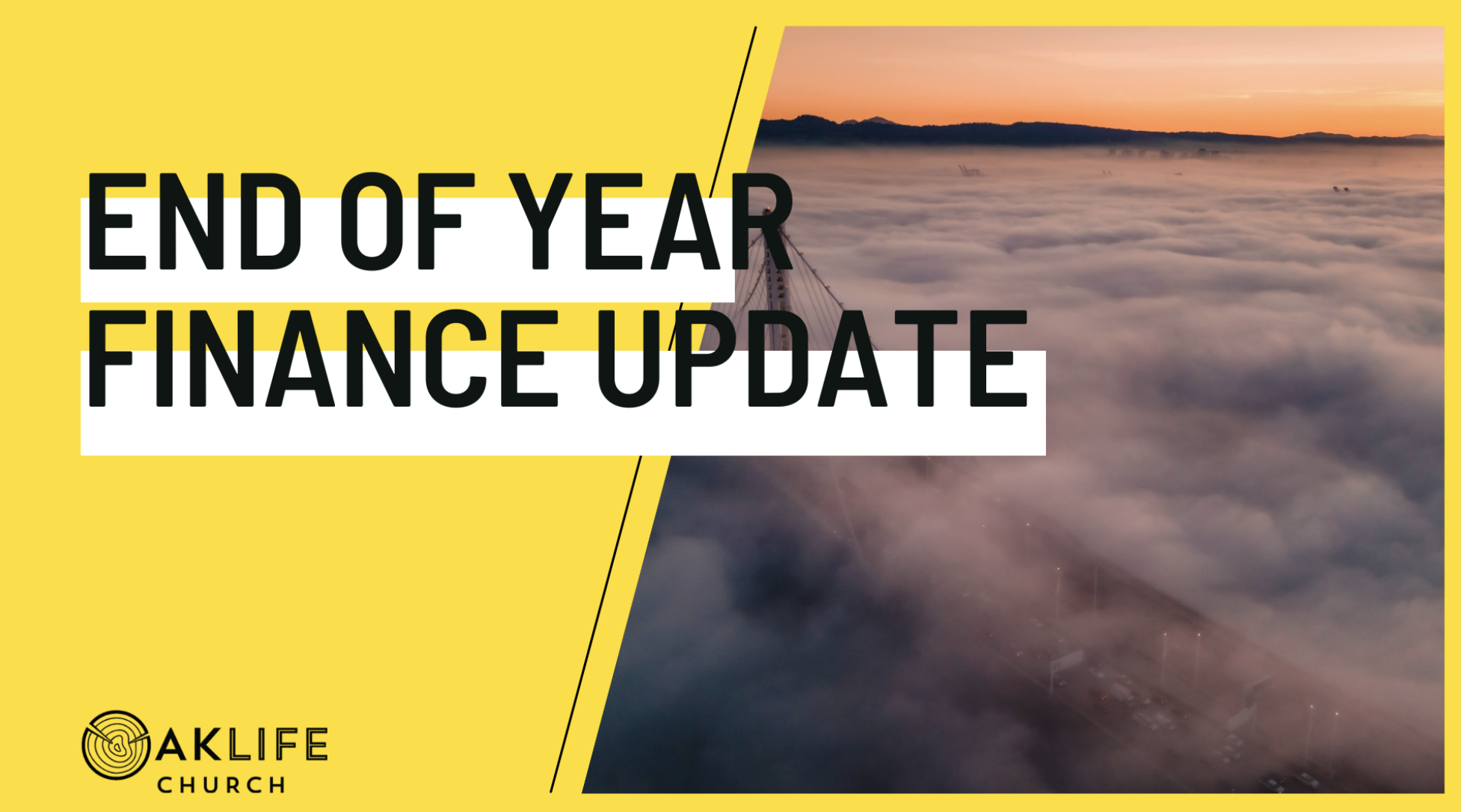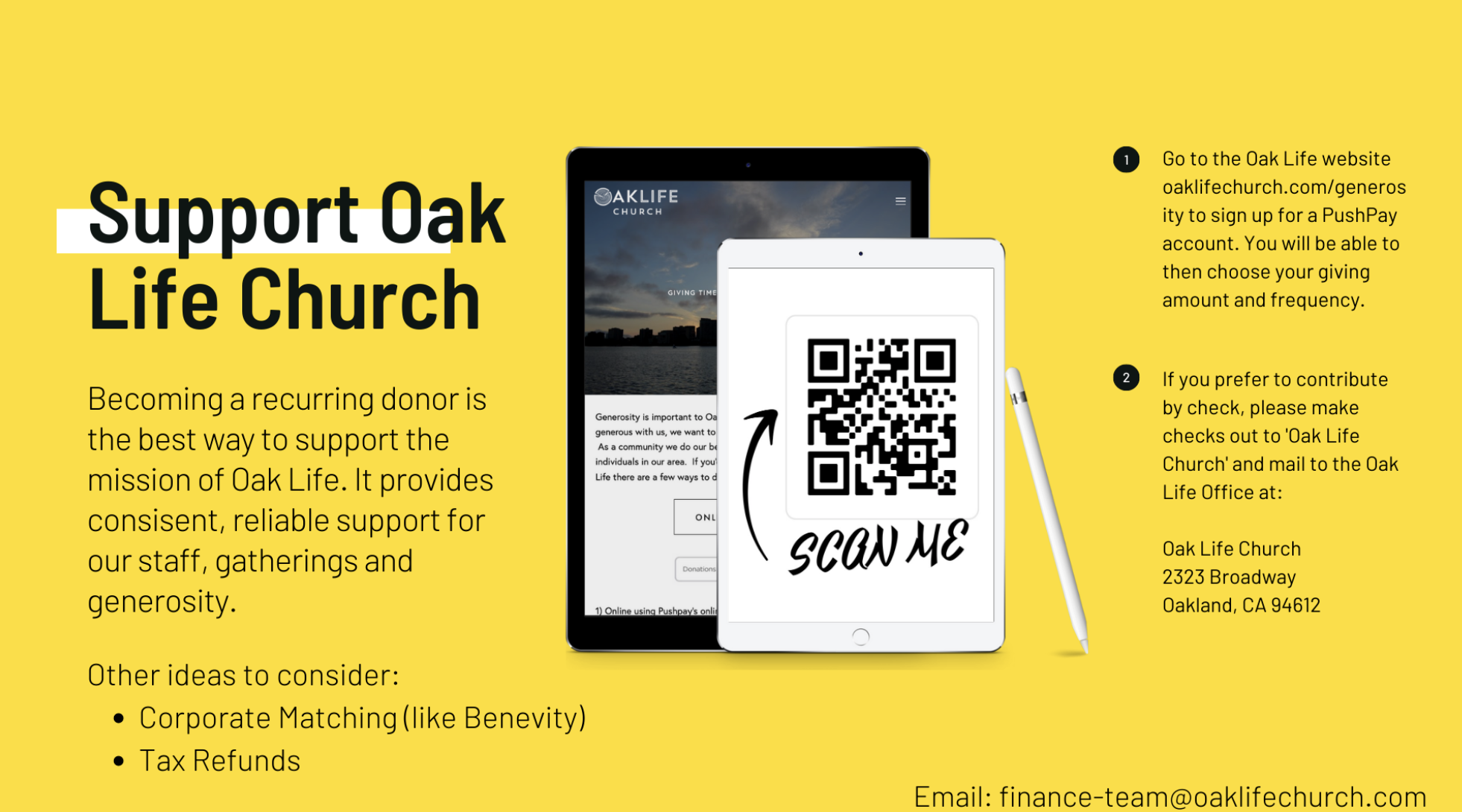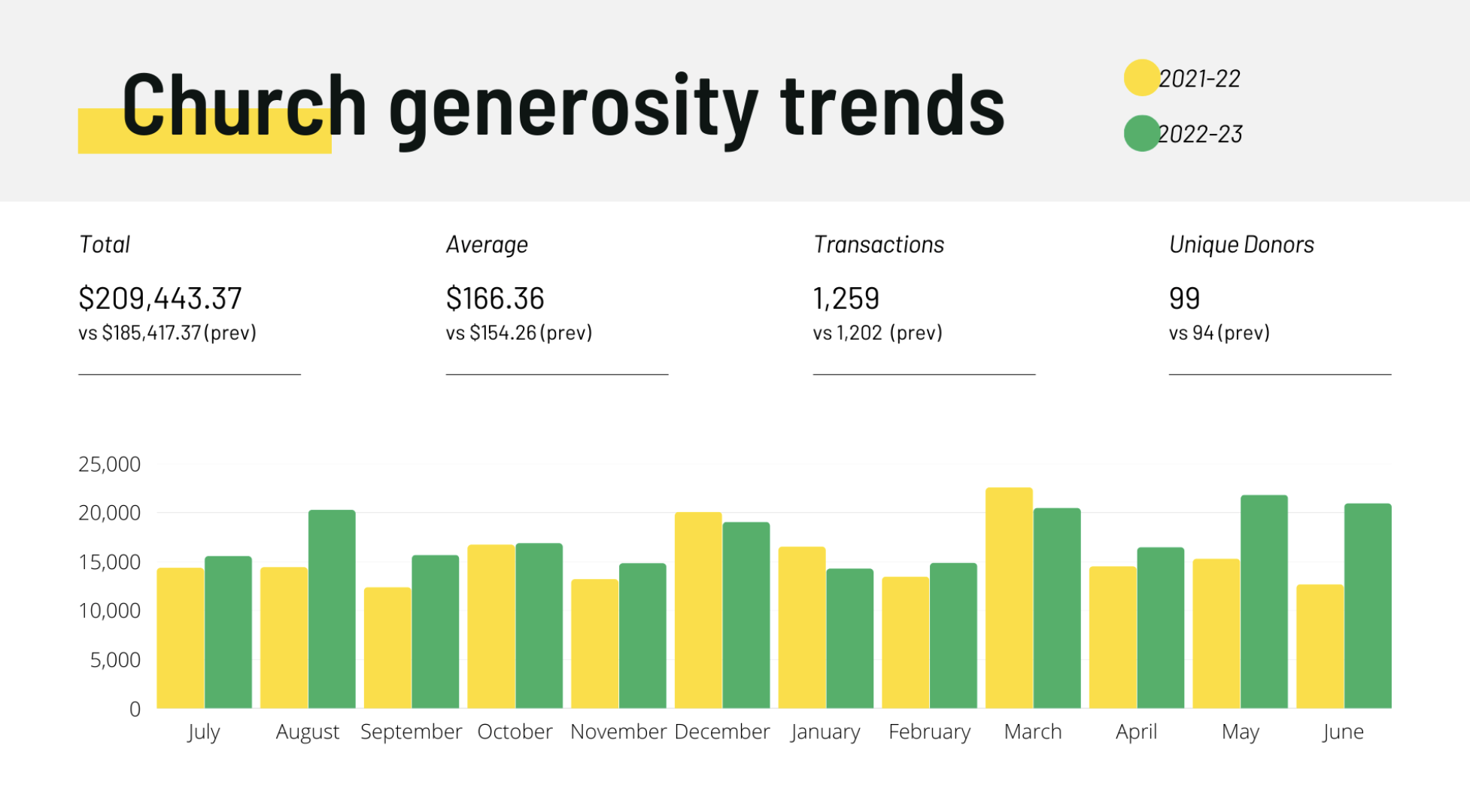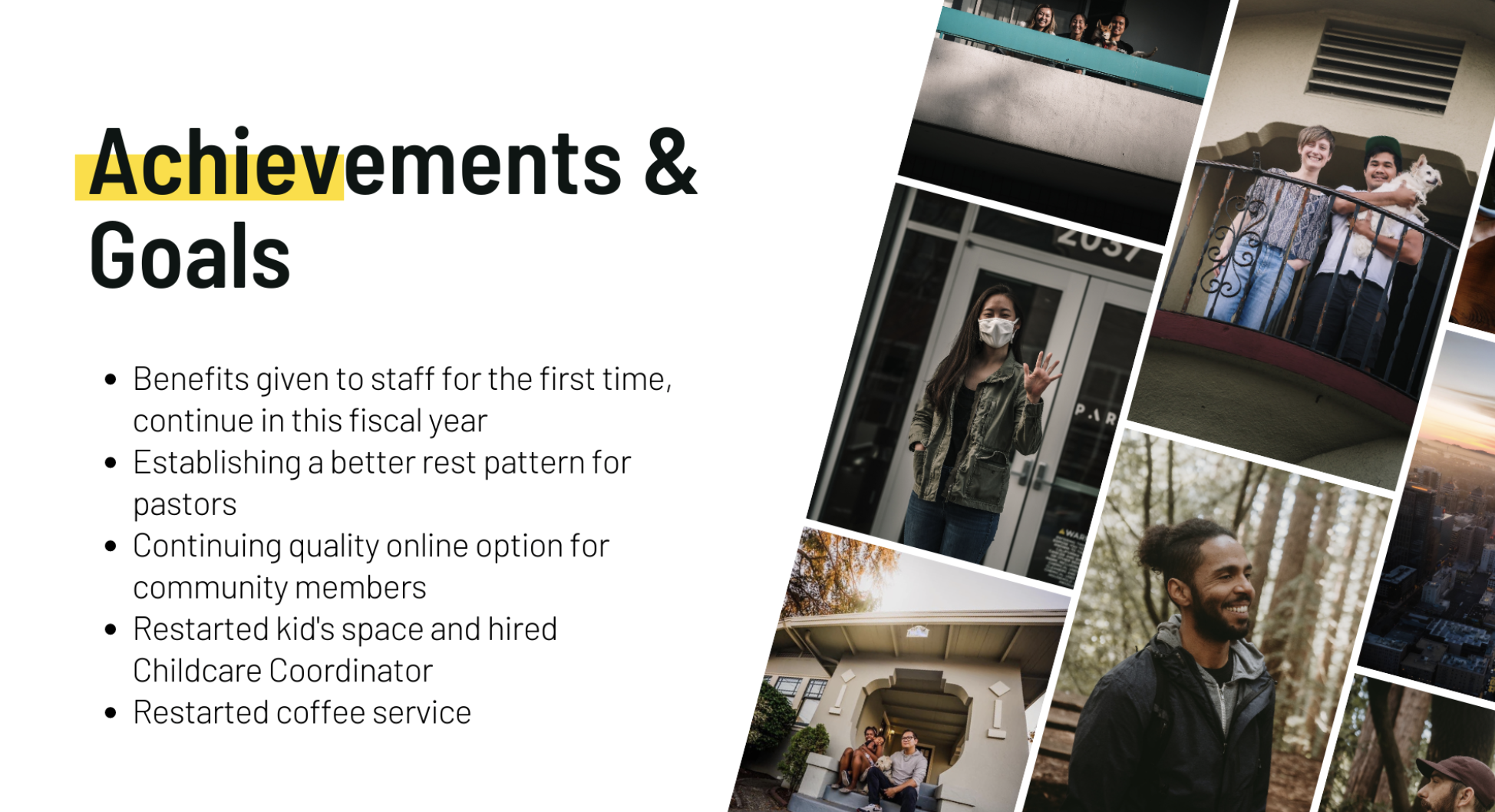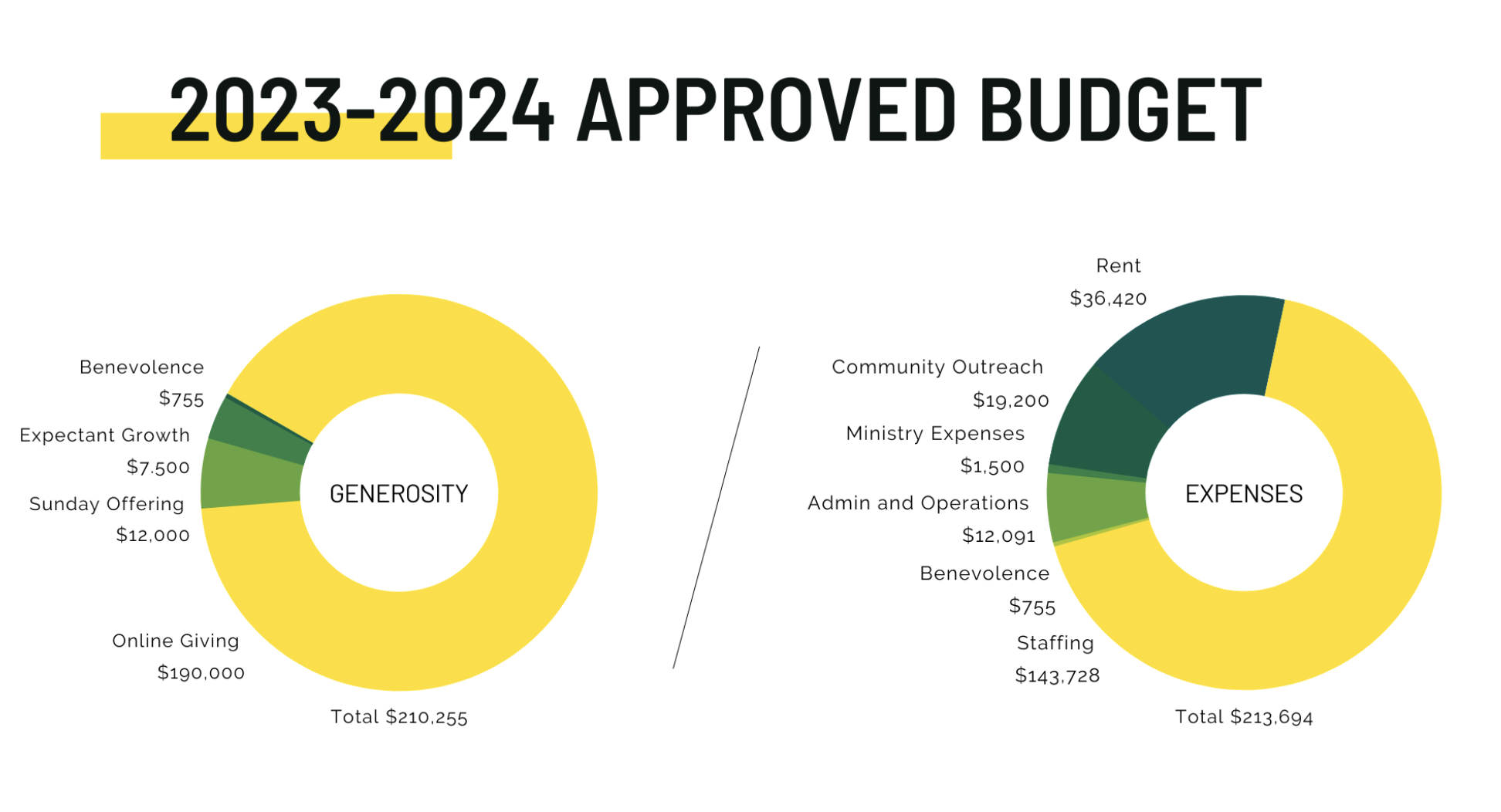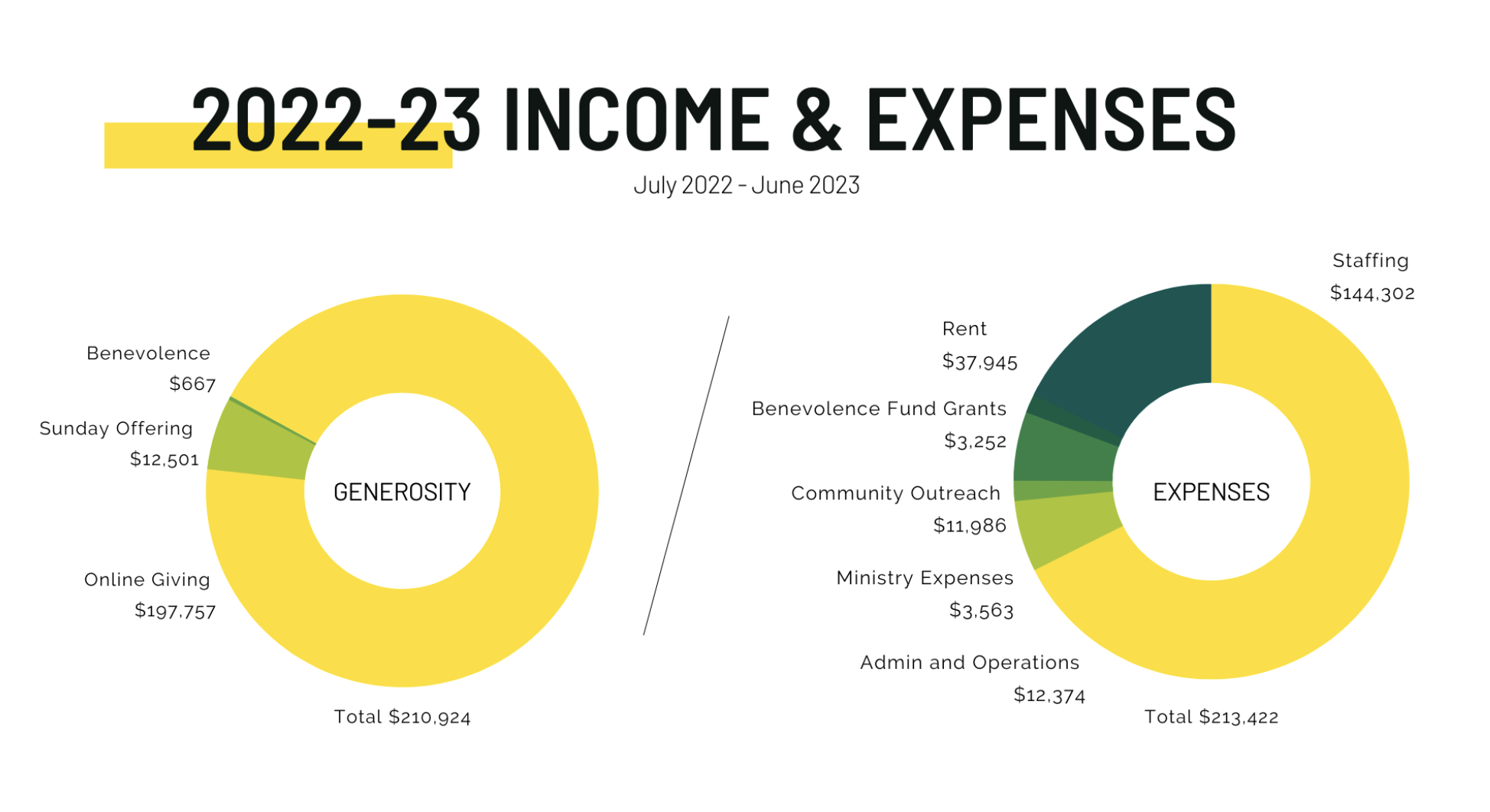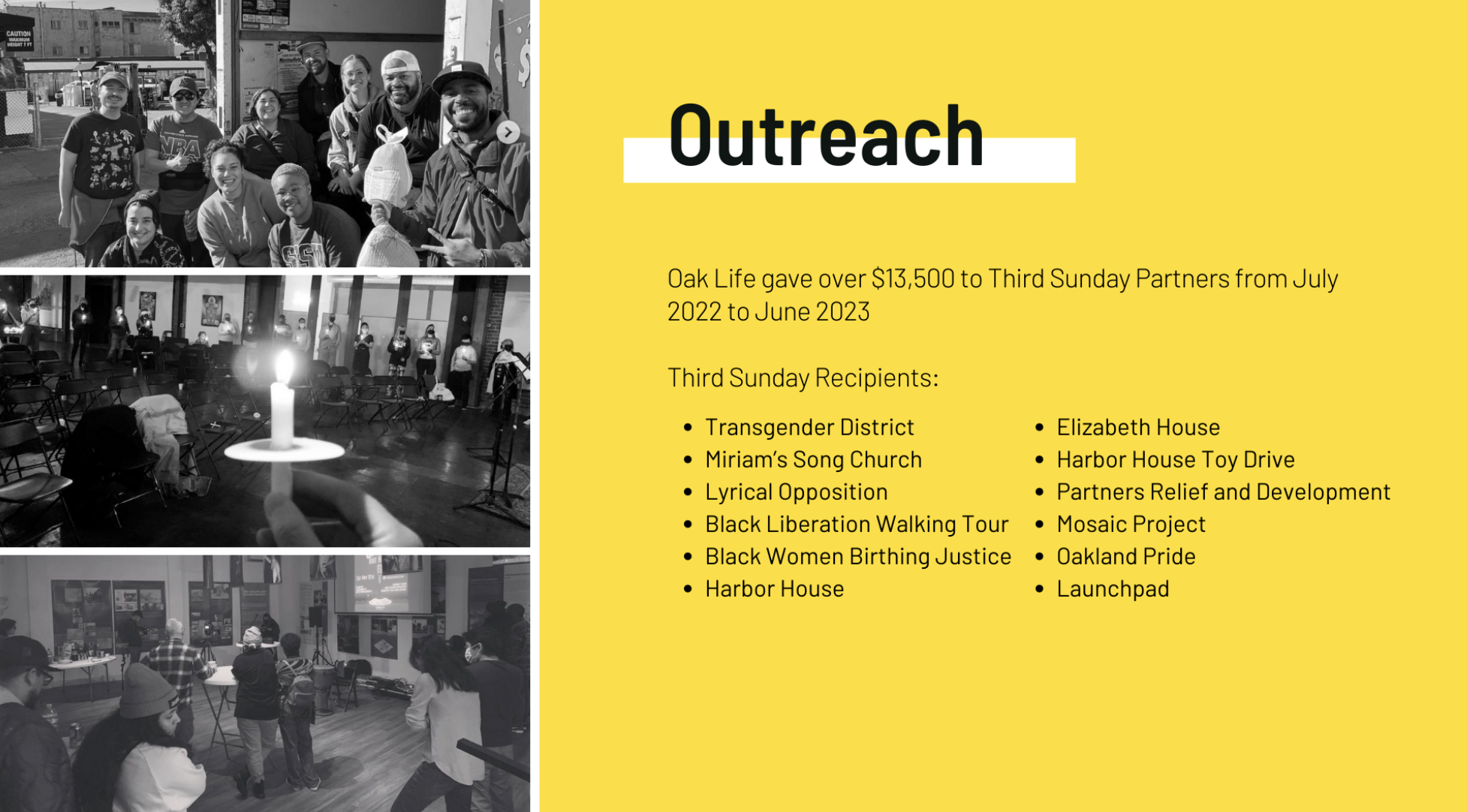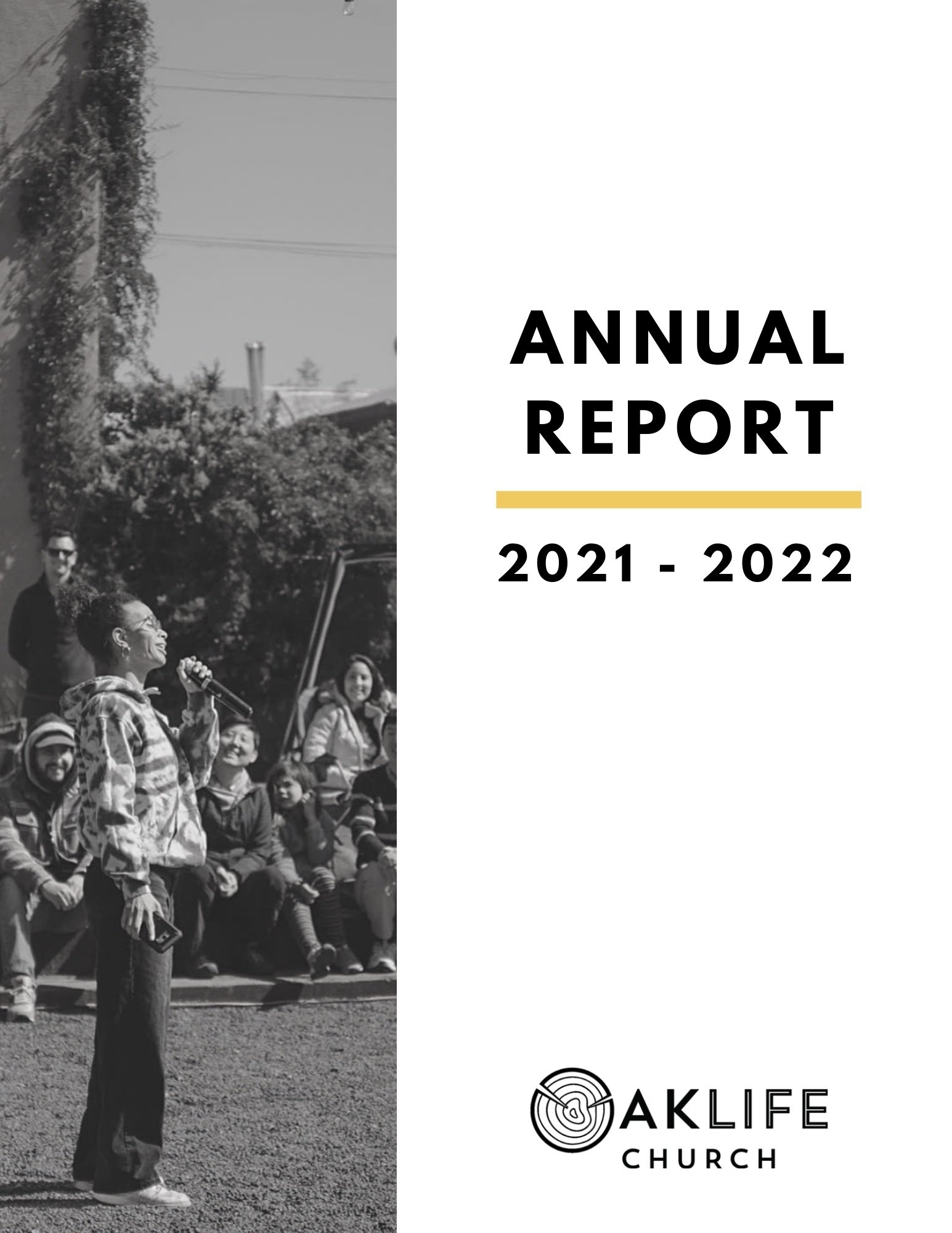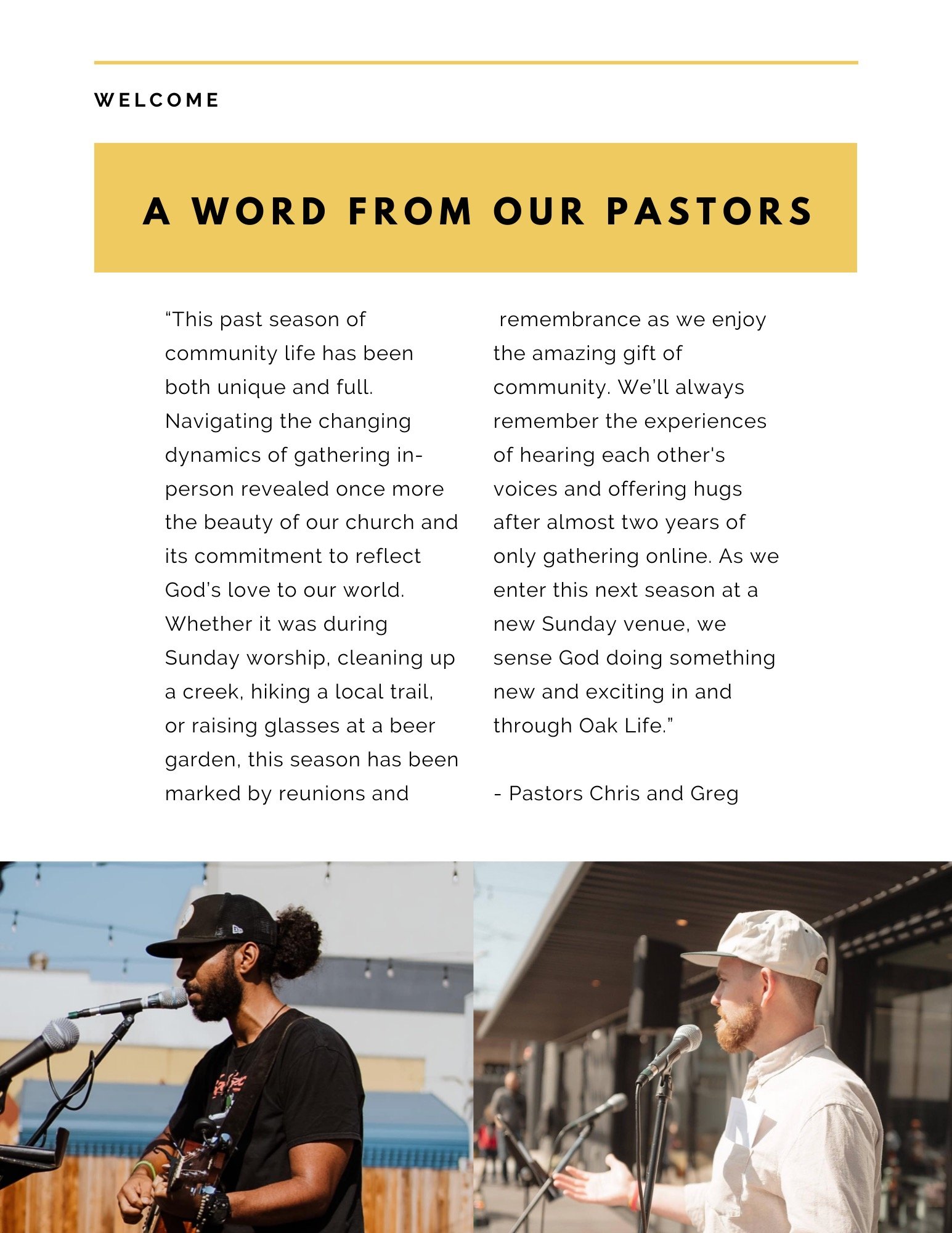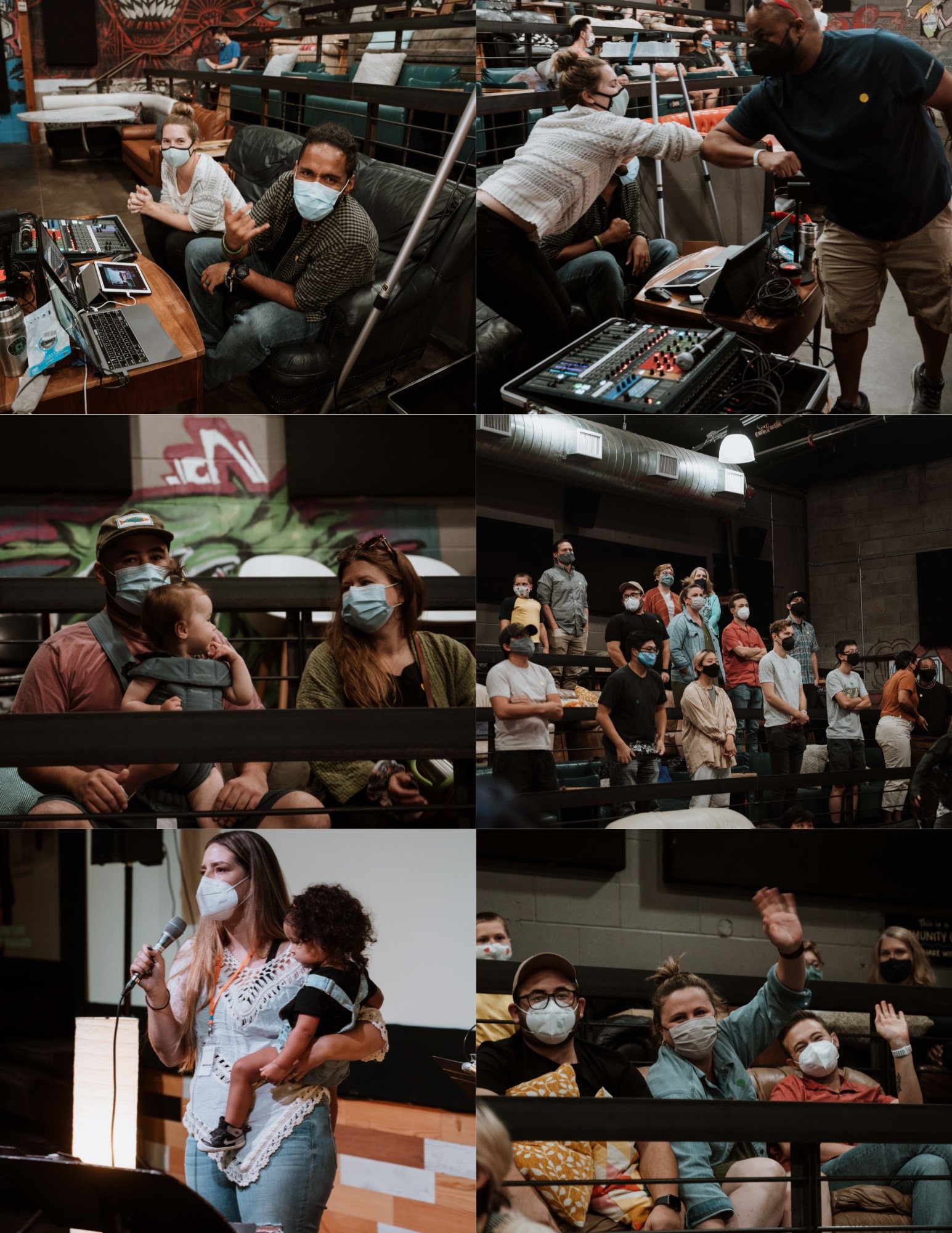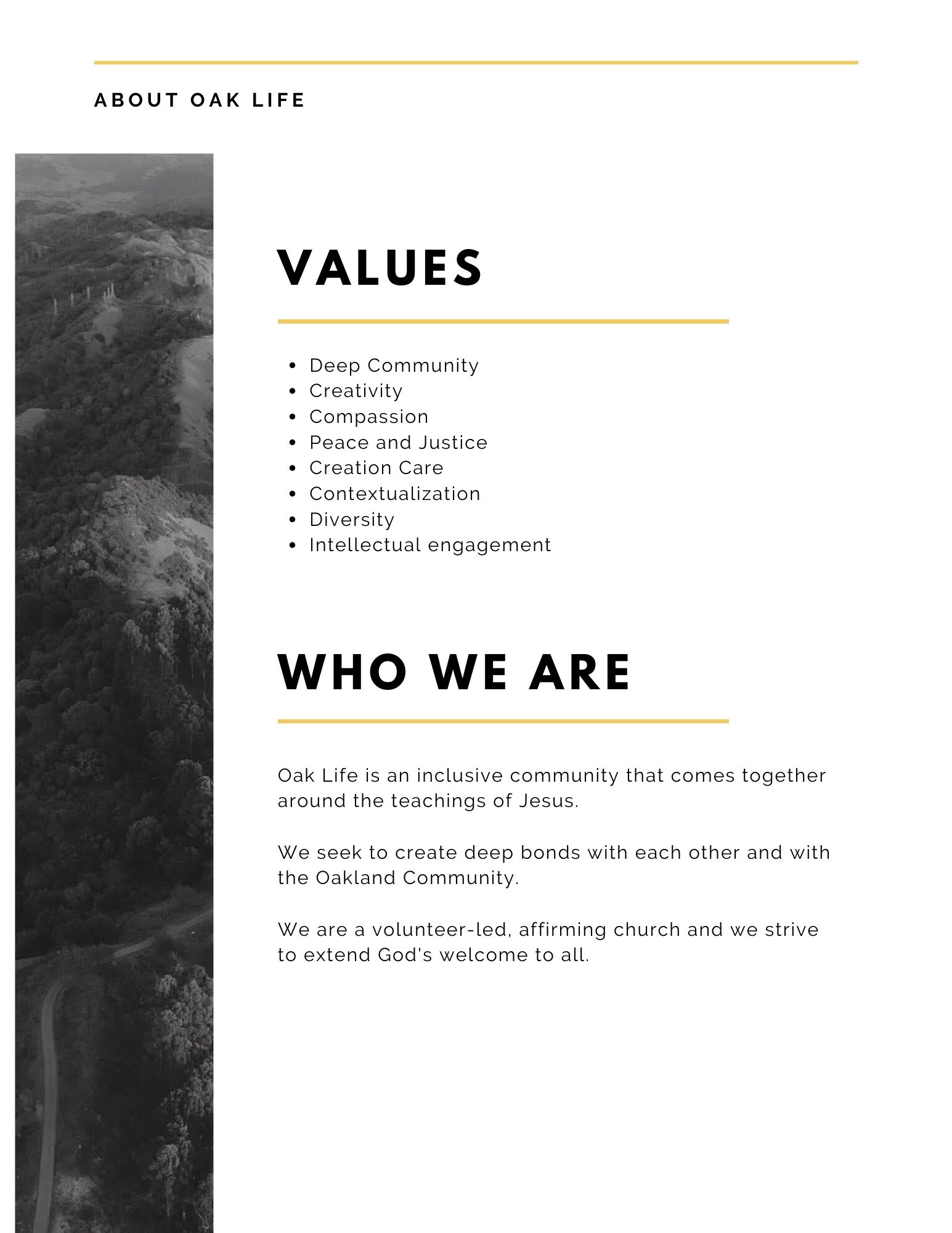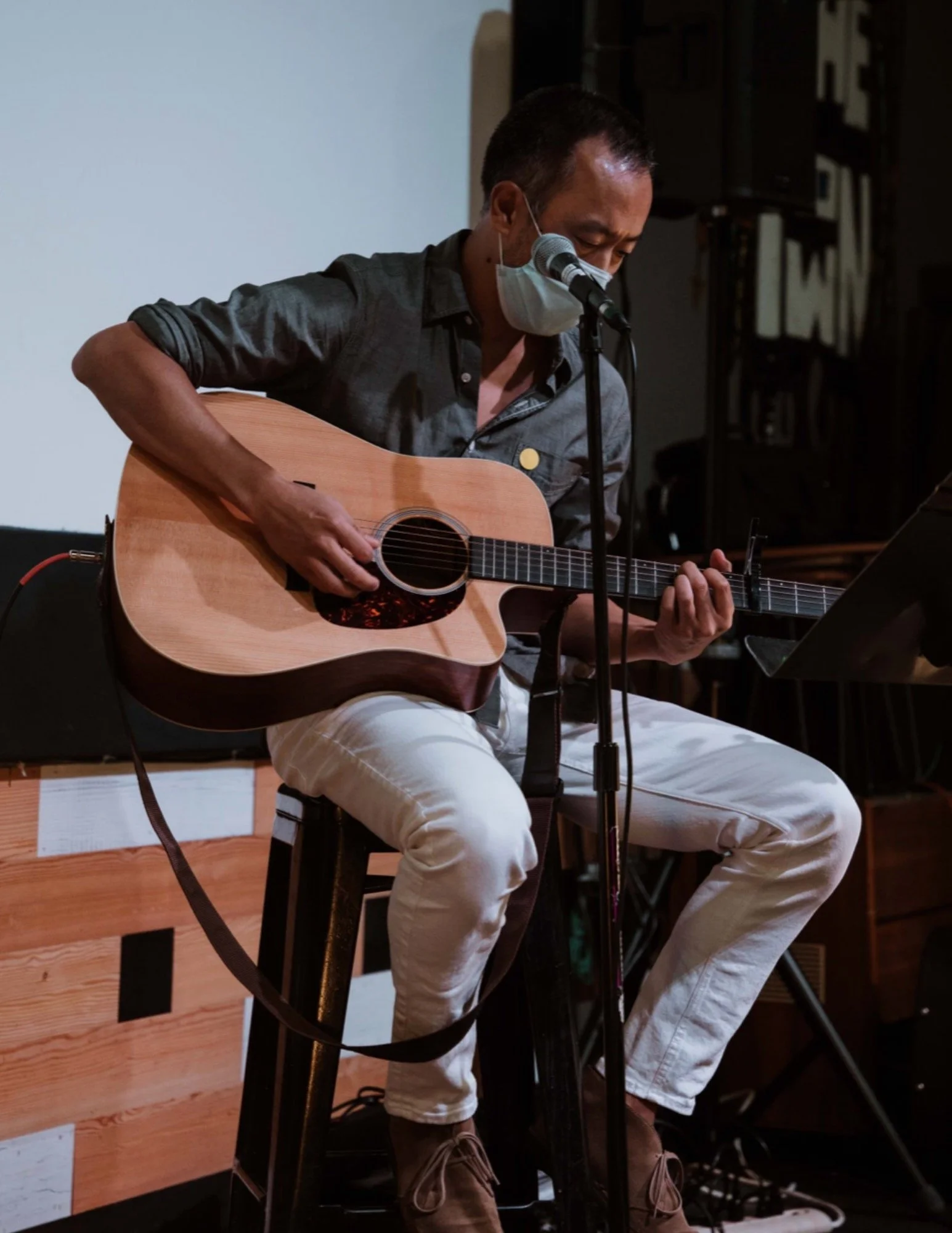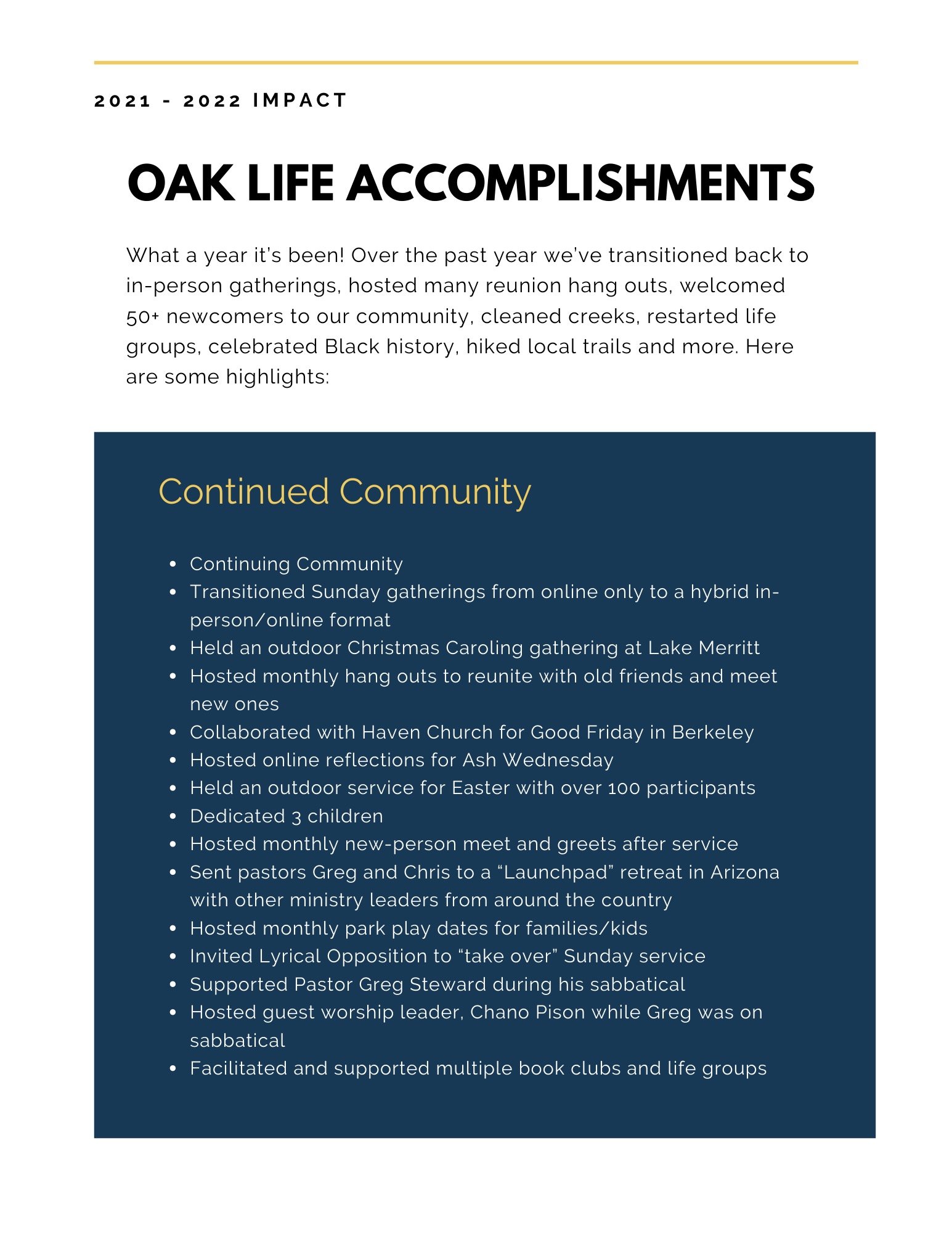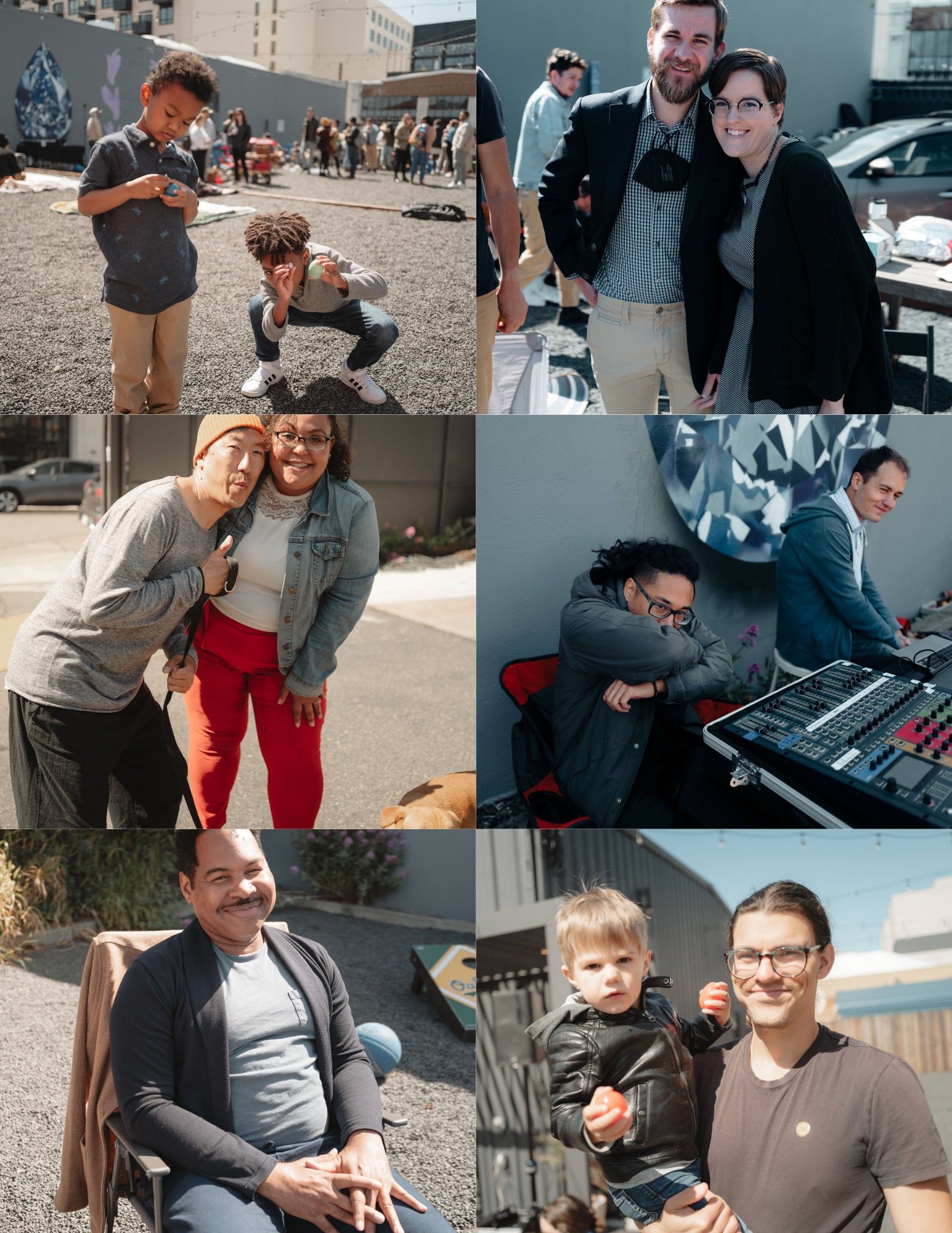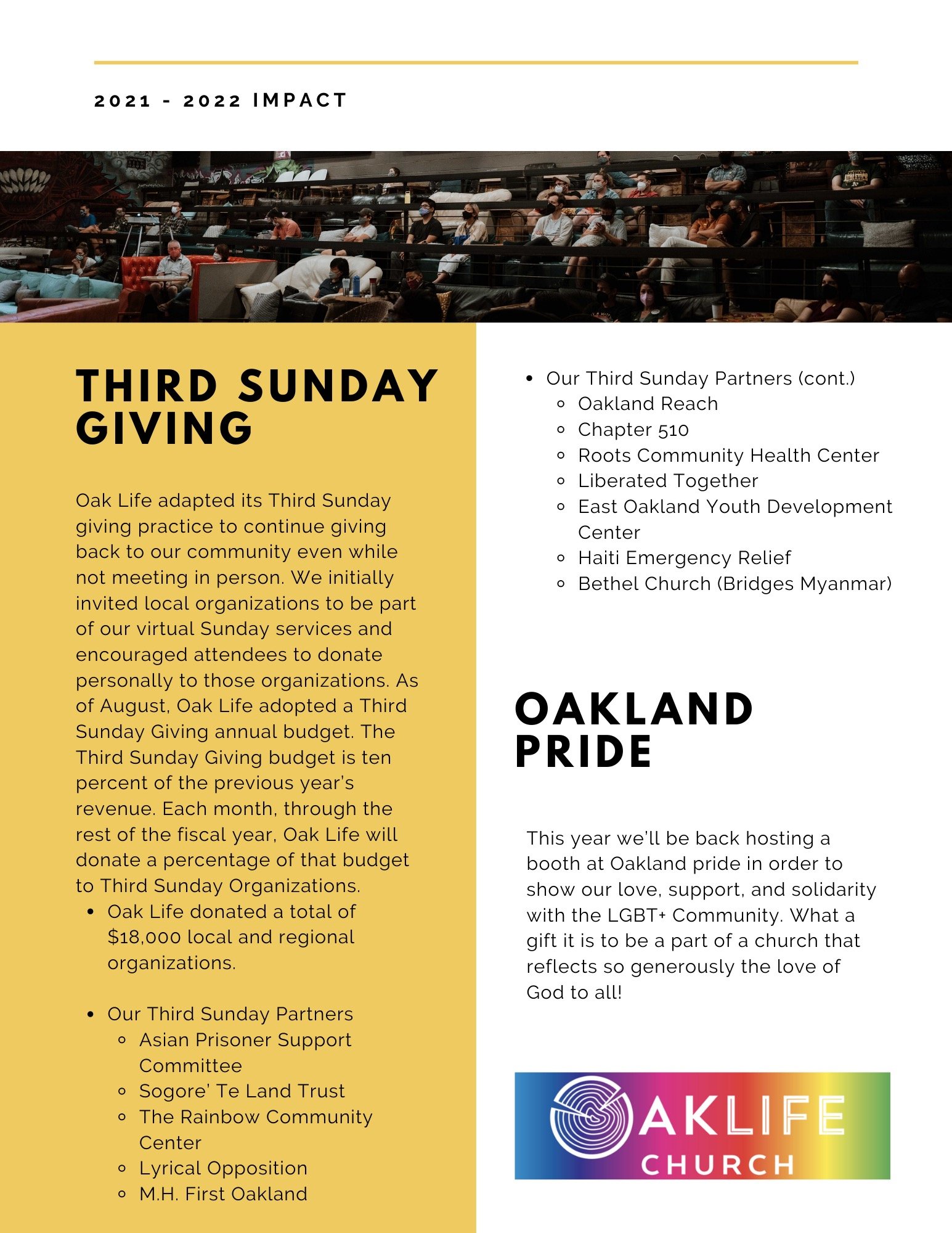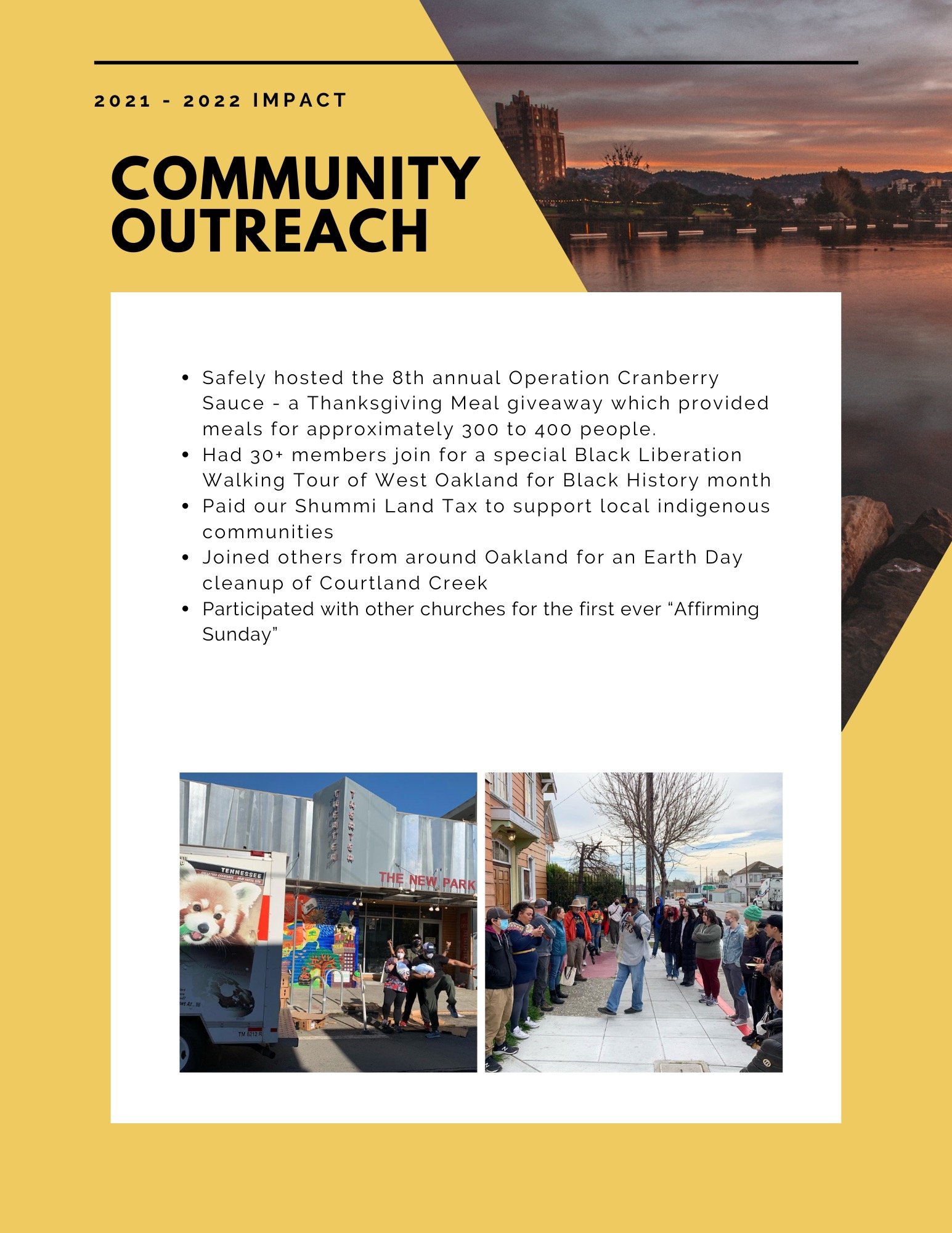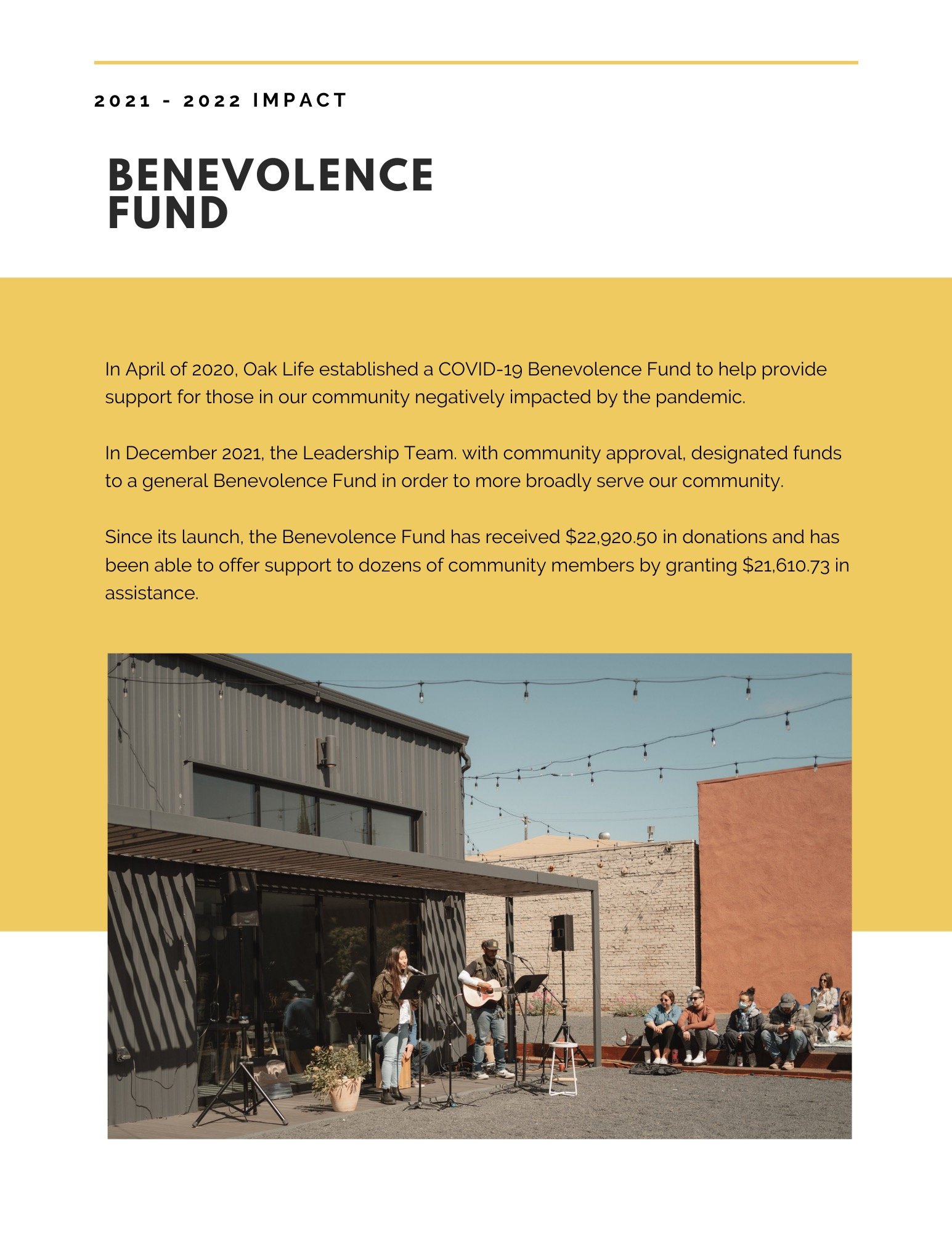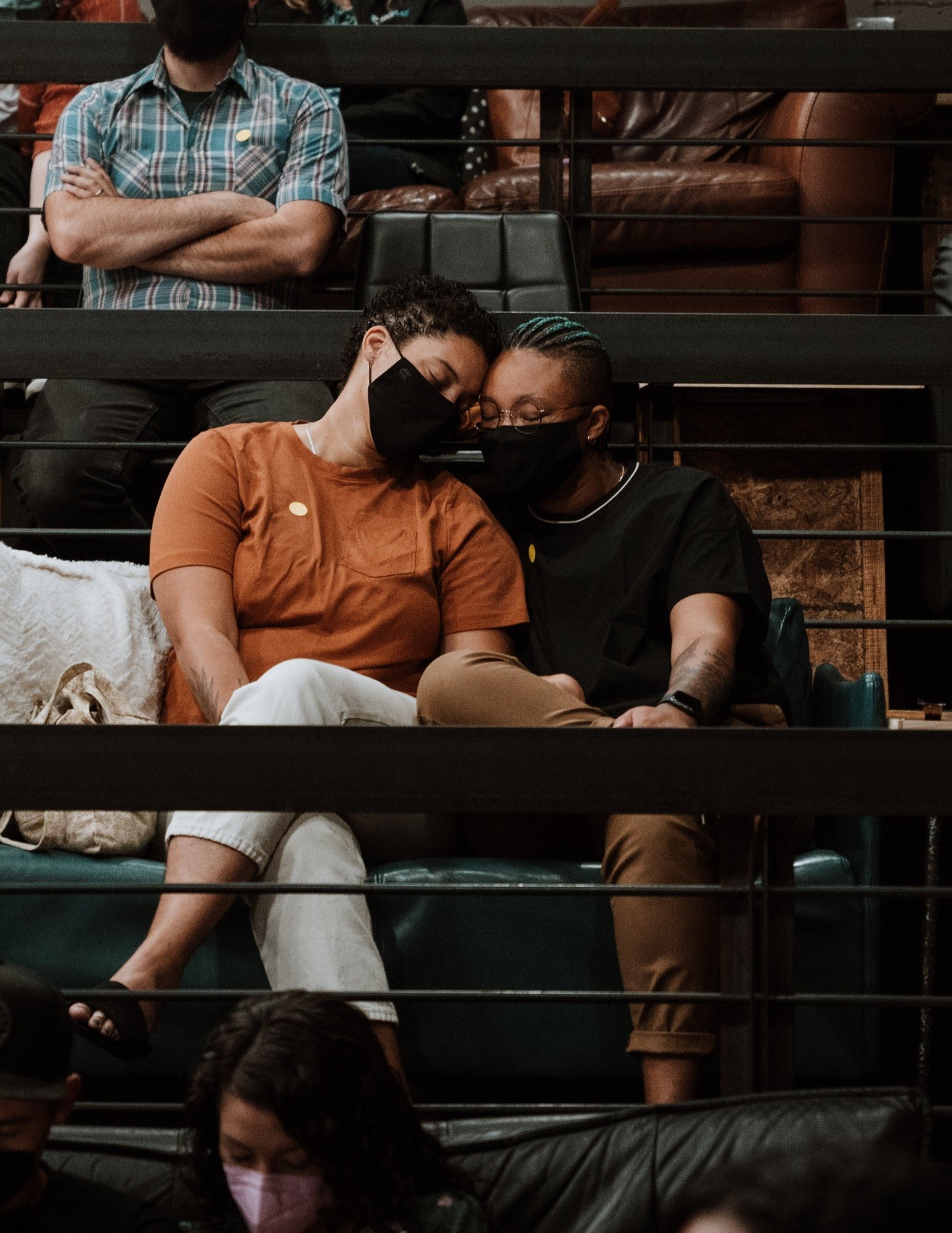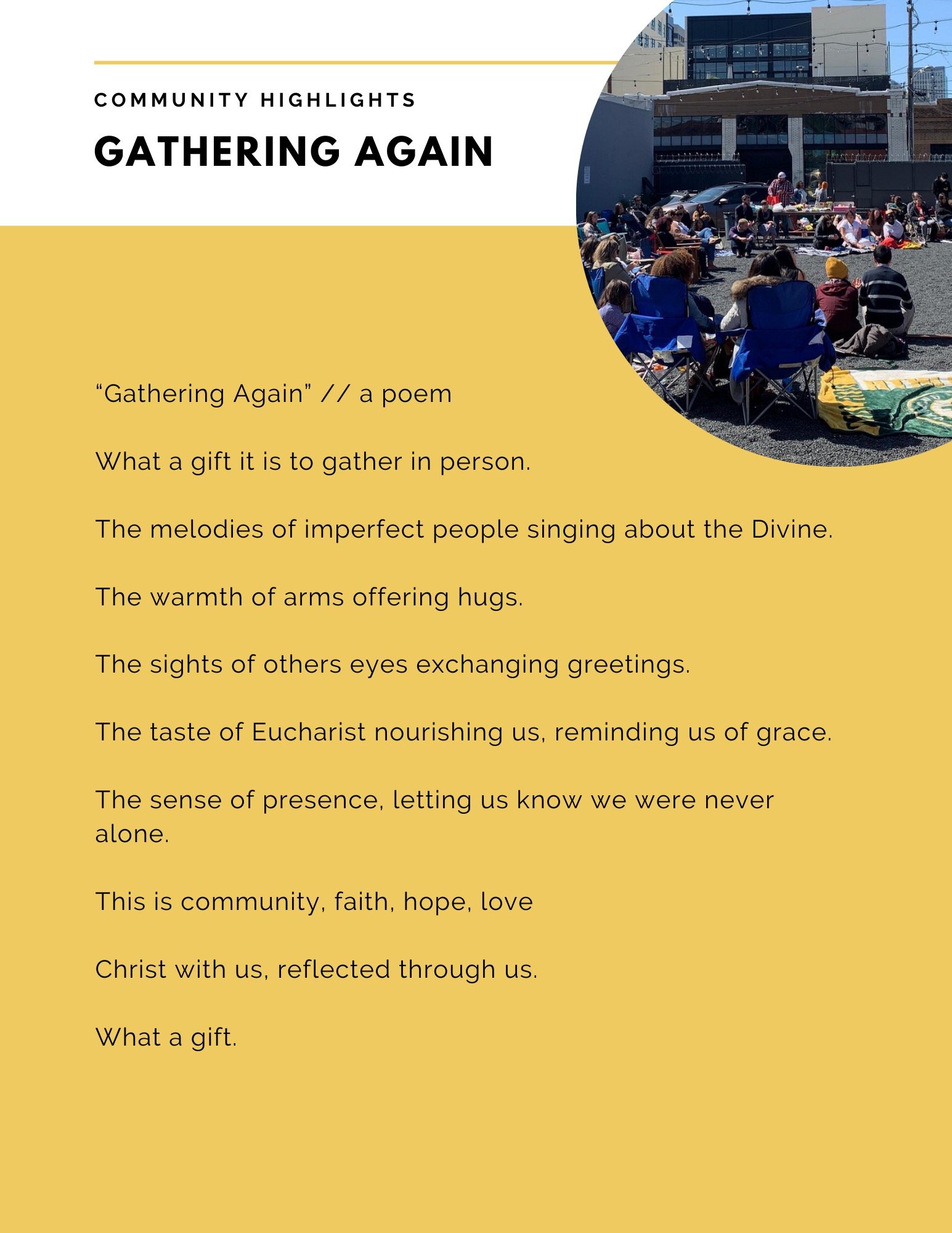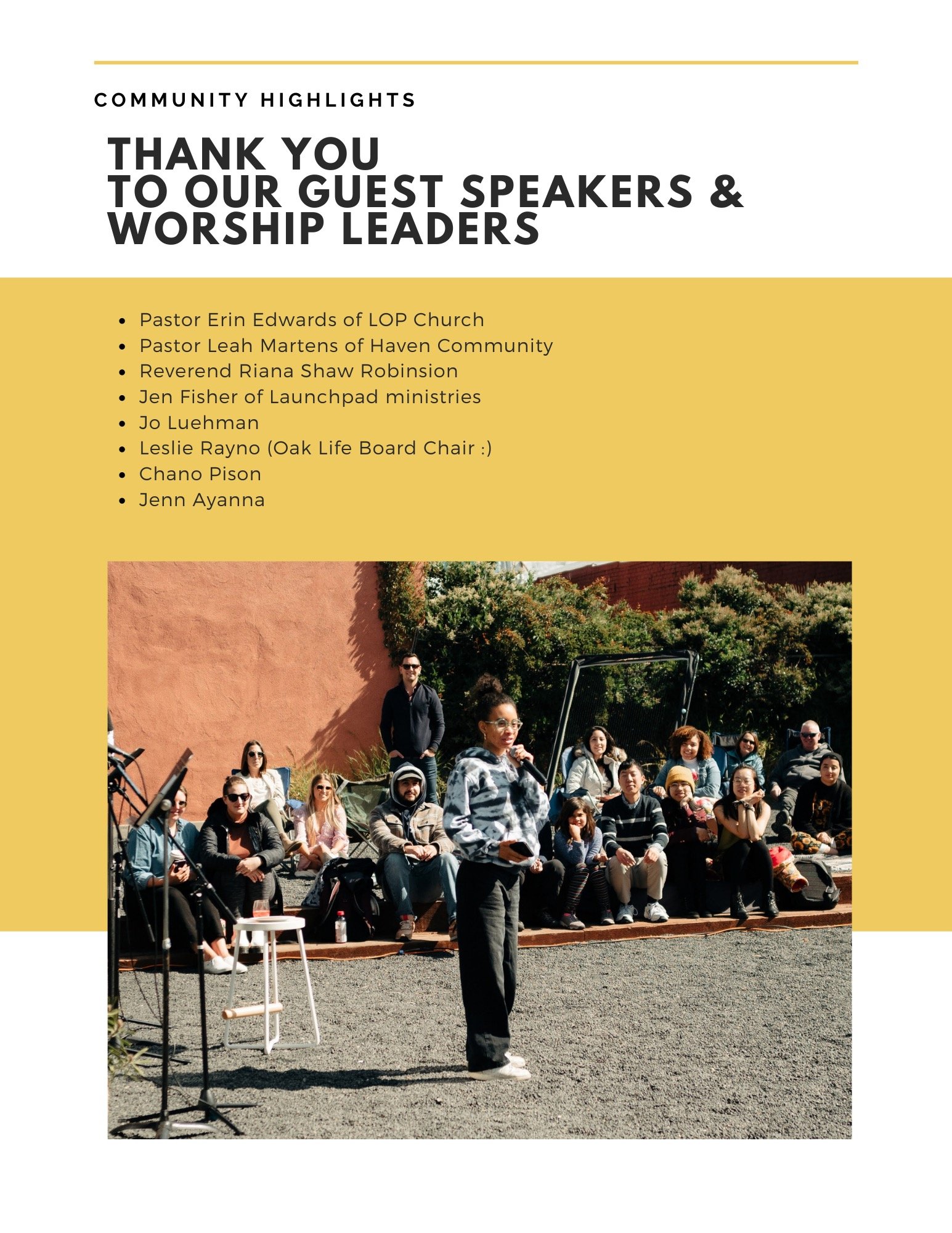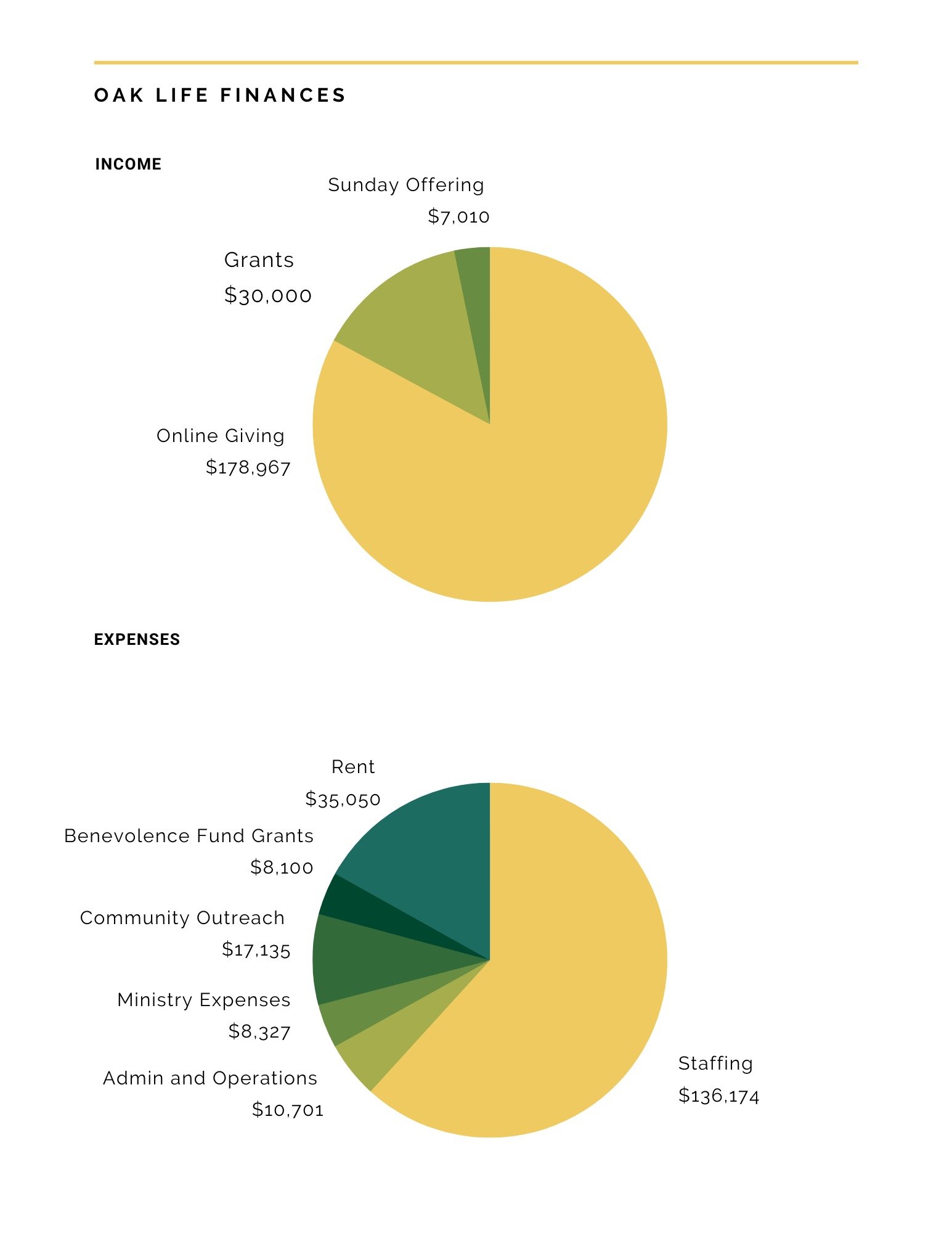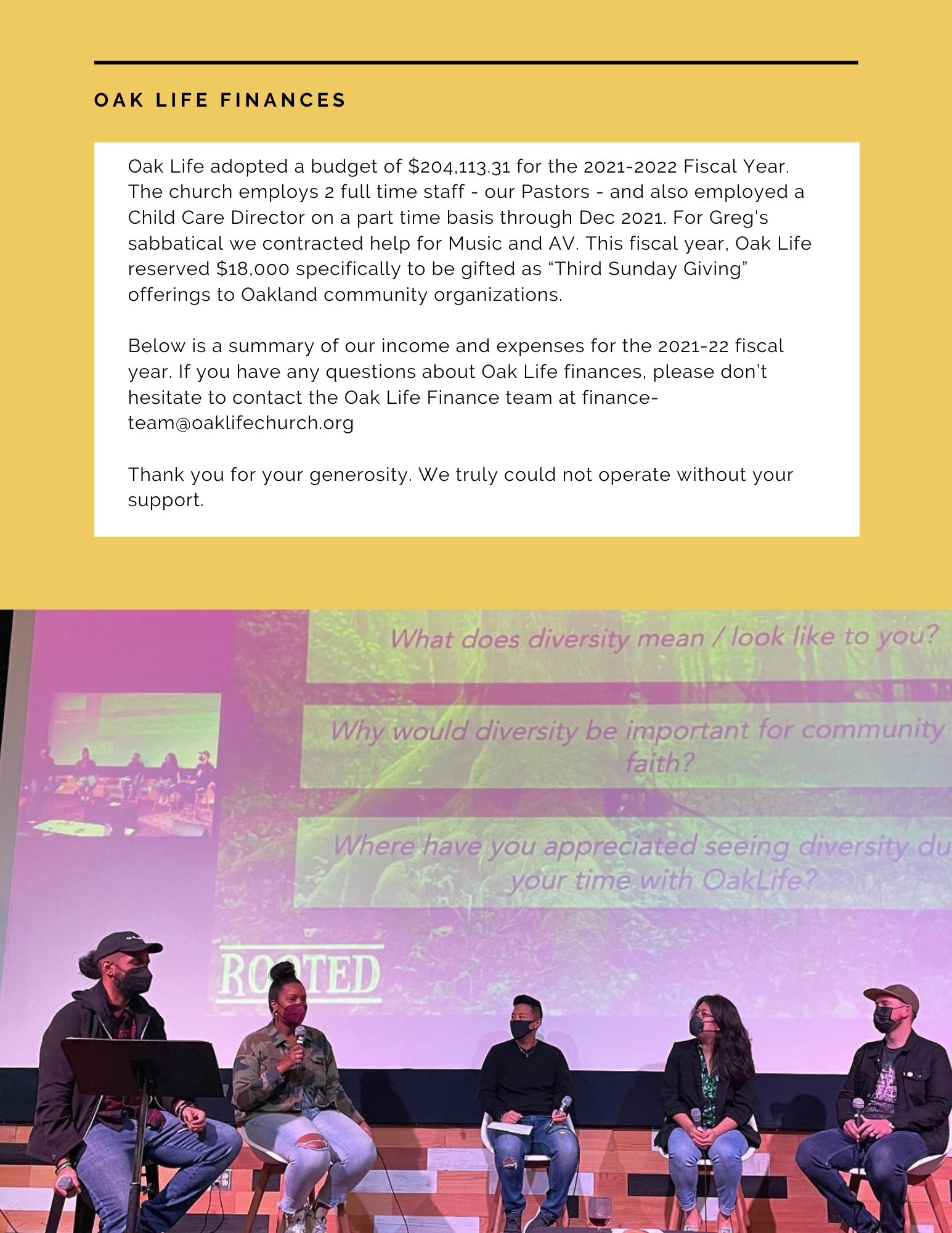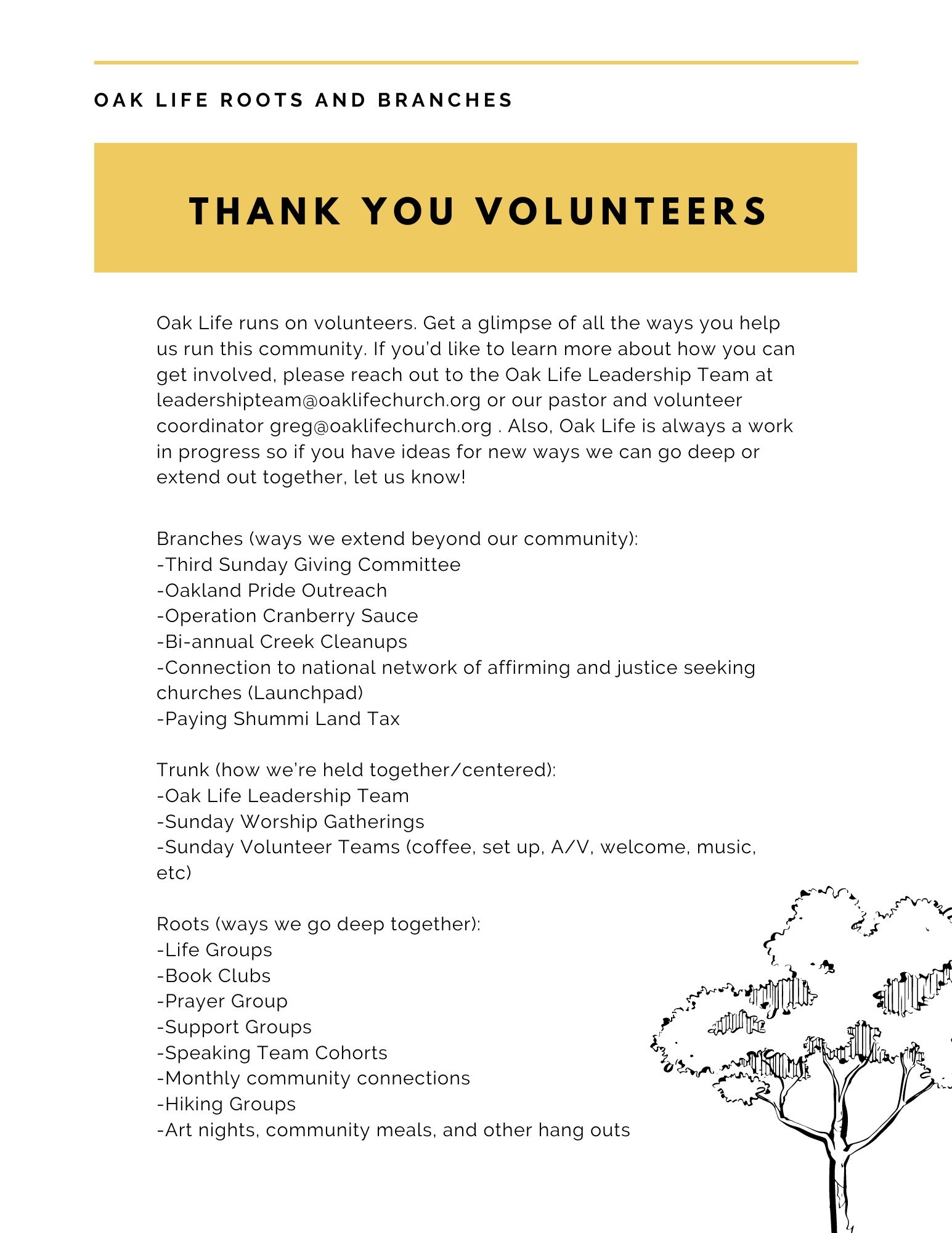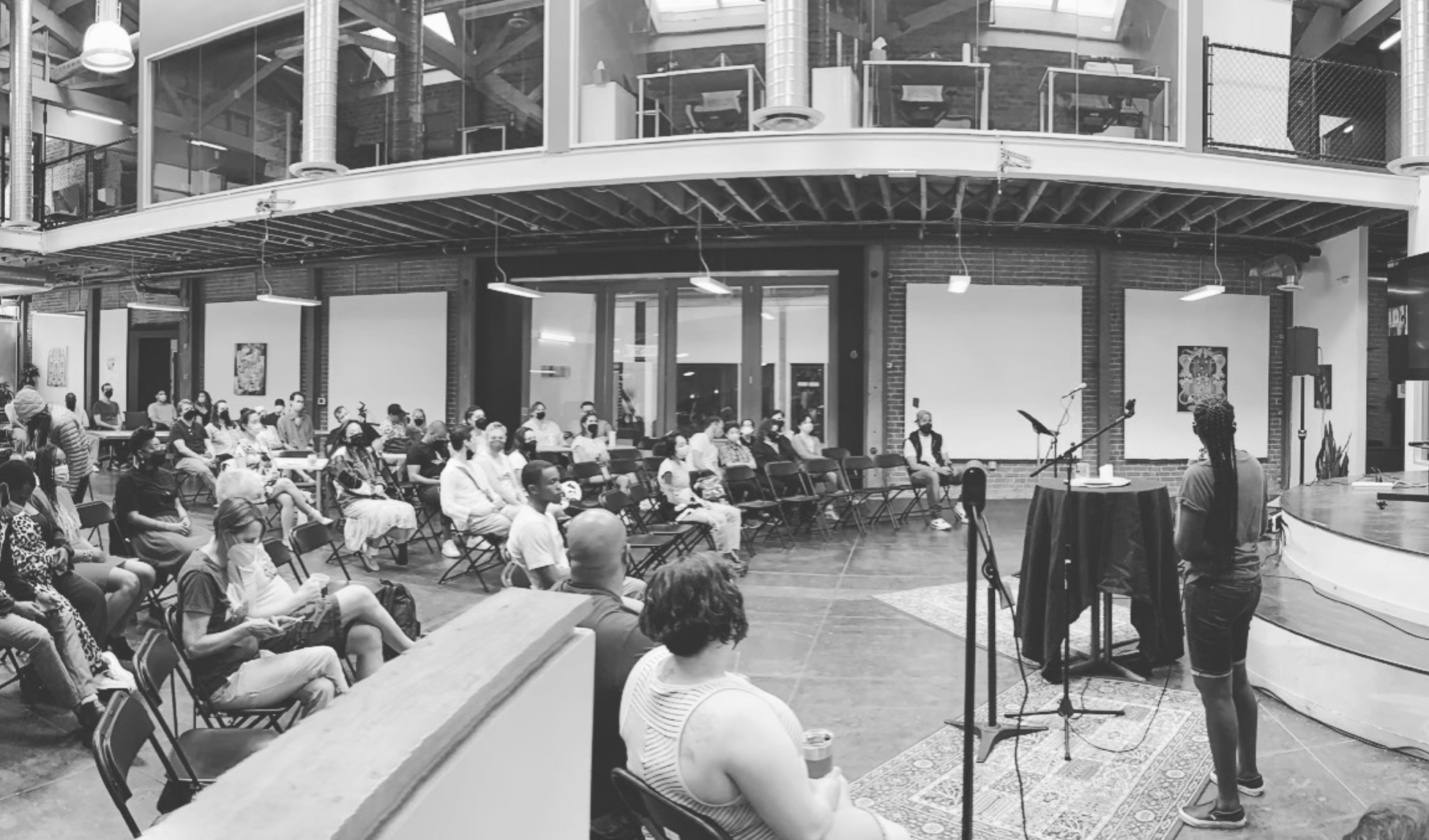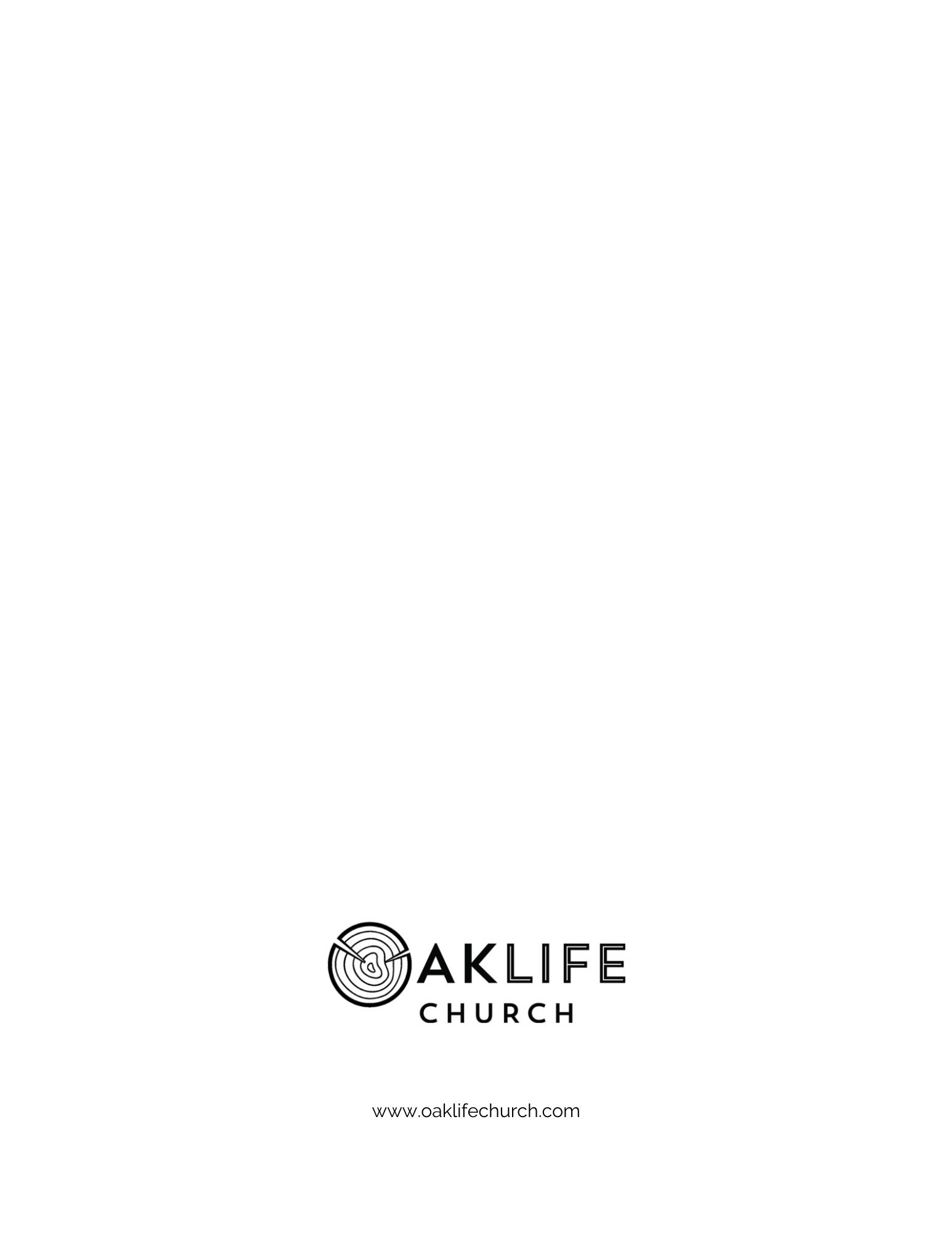It’s a few months late, but here’s Oak Life’s Annual Report for the fiscal year 2022-2023. Feel free to reach out to the Finance Team at finance-team@oaklifechurch.com if you have any questions!
July-September 2023 Finance Update
Hello! This is our latest Oak Life Finance Update for the first quarter of our 2023-24 fiscal year (Jul-Sep). Our goal here is to report out the metrics we believe matter most. If you are interested in more of a deep dive, please contact our finance team at finance-team@oaklifechurch.com to learn more. Thanks for reading!
Oak Life Fiscal Update
Hi again from the finance team! Here is information on our most recent fiscal year. Our goal here is to report out the metrics we believe matter most. If you are interested in more of a deep dive, please contact our finance team at finance-team@oaklifechurch.com to learn more.
2022-2023 Mid-Year Finance Update
Hi again from the finance team! We have another quarterly update for you. This is the same information that was presented on Sunday, Feb 26th so if you missed it or wanted a closer look at the information, here it is. Our goal here is to report out the metrics we believe matter most. If you are interested in more of a deep dive, please contact our finance team at finance-team@oaklifechurch.com to learn more.
Letter From a Birmingham Jail
LETTER FROM BIRMINGHAM JAIL
APRIL 16, 1963
MY DEAR FELLOW CLERGYMEN:
While confined here in the Birmingham city jail, I came across your recent statement calling my present activities "unwise and untimely." Seldom do I pause to answer criticism of my work and ideas. If I sought to answer all the criticisms that cross my desk, my secretaries would have little time for anything other than such correspondence in the course of the day, and I would have no time for constructive work. But since I feel that you are men of genuine good will and that your criticisms are sincerely set forth, I want to try to answer your statements in what I hope will be patient and reasonable terms.
I think I should indicate why I am here In Birmingham, since you have been influenced by the view which argues against "outsiders coming in." I have the honor of serving as president of the Southern Christian Leadership Conference, an organization operating in every southern state, with headquarters in Atlanta, Georgia. We have some eighty-five affiliated organizations across the South, and one of them is the Alabama Christian Movement for Human Rights. Frequently we share staff, educational and financial resources with our affiliates. Several months ago the affiliate here in Birmingham asked us to be on call to engage in a nonviolent direct-action program if such were deemed necessary. We readily consented, and when the hour came we lived up to our promise. So I, along with several members of my staff, am here because I was invited here I am here because I have organizational ties here.
But more basically, I am in Birmingham because injustice is here. Just as the prophets of the eighth century B.C. left their villages and carried their "thus saith the Lord" far beyond the boundaries of their home towns, and just as the Apostle Paul left his village of Tarsus and carried the gospel of Jesus Christ to the far corners of the Greco-Roman world, so am I compelled to carry the gospel of freedom beyond my own home town. Like Paul, I must constantly respond to the Macedonian call for aid.
Moreover, I am cognizant of the interrelatedness of all communities and states. I cannot sit idly by in Atlanta and not be concerned about what happens in Birmingham. Injustice anywhere is a threat to justice everywhere. We are caught in an inescapable network of mutuality, tied in a single garment of destiny. Whatever affects one directly, affects all indirectly. Never again can we afford to live with the narrow, provincial "outside agitator" idea. Anyone who lives inside the United States can never be considered an outsider anywhere within its bounds.
You deplore the demonstrations taking place in Birmingham. But your statement, I am sorry to say, fails to express a similar concern for the conditions that brought about the demonstrations. I am sure that none of you would want to rest content with the superficial kind of social analysis that deals merely with effects and does not grapple with underlying causes. It is unfortunate that demonstrations are taking place in Birmingham, but it is even more unfortunate that the city's white power structure left the Negro community with no alternative.
In any nonviolent campaign there are four basic steps: collection of the facts to determine whether injustices exist; negotiation; self-purification; and direct action. We have gone through all of these steps in Birmingham. There can be no gainsaying the fact that racial injustice engulfs this community. Birmingham is probably the most thoroughly segregated city in the United States. Its ugly record of brutality is widely known. Negroes have experienced grossly unjust treatment in the courts. There have been more unsolved bombings of Negro homes and churches in Birmingham than in any other city in the nation. These are the hard, brutal facts of the case. On the basis of these conditions, Negro leaders sought to negotiate with the city fathers. But the latter consistently refused to engage in good-faith negotiation.
Then, last September, came the opportunity to talk with leaders of Birmingham's economic community. In the course of the negotiations, certain promises were made by the merchants --- for example, to remove the stores humiliating racial signs. On the basis of these promises, the Reverend Fred Shuttlesworth and the leaders of the Alabama Christian Movement for Human Rights agreed to a moratorium on all demonstrations. As the weeks and months went by, we realized that we were the victims of a broken promise. A few signs, briefly removed, returned; the others remained.
As in so many past experiences, our hopes had been blasted, and the shadow of deep disappointment settled upon us. We had no alternative except to prepare for direct action, whereby we would present our very bodies as a means of laying our case before the conscience of the local and the national community. Mindful of the difficulties involved, we decided to undertake a process of self-purification. We began a series of workshops on nonviolence, and we repeatedly asked ourselves : "Are you able to accept blows without retaliating?" "Are you able to endure the ordeal of jail?" We decided to schedule our direct-action program for the Easter season, realizing that except for Christmas, this is the main shopping period of the year. Knowing that a strong economic withdrawal program would be the by-product of direct action, we felt that this would be the best time to bring pressure to bear on the merchants for the needed change.
Then it occurred to us that Birmingham's mayoralty election was coming up in March, and we speedily decided to postpone action until after election day. When we discovered that the Commissioner of Public Safety, Eugene "Bull" Connor, had piled up enough votes to be in the run-off we decided again to postpone action until the day after the run-off so that the demonstrations could not be used to cloud the issues. Like many others, we waited to see Mr. Connor defeated, and to this end we endured postponement after postponement. Having aided in this community need, we felt that our direct-action program could be delayed no longer.
You may well ask: "Why direct action? Why sit-ins, marches and so forth? Isn't negotiation a better path?" You are quite right in calling, for negotiation. Indeed, this is the very purpose of direct action. Nonviolent direct action seeks to create such a crisis and foster such a tension that a community which has constantly refused to negotiate is forced to confront the issue. It seeks to so dramatize the issue that it can no longer be ignored. My citing the creation of tension as part of the work of the nonviolent-resister may sound rather shocking. But I must confess that I am not afraid of the word "tension." I have earnestly opposed violent tension, but there is a type of constructive, nonviolent tension which is necessary for growth. Just as Socrates felt that it was necessary to create a tension in the mind so that individuals could rise from the bondage of myths and half-truths to the unfettered realm of creative analysis and objective appraisal, we must we see the need for nonviolent gadflies to create the kind of tension in society that will help men rise from the dark depths of prejudice and racism to the majestic heights of understanding and brotherhood.
The purpose of our direct-action program is to create a situation so crisis-packed that it will inevitably open the door to negotiation. I therefore concur with you in your call for negotiation. Too long has our beloved Southland been bogged down in a tragic effort to live in monologue rather than dialogue.
One of the basic points in your statement is that the action that I and my associates have taken .in Birmingham is untimely. Some have asked: "Why didn't you give the new city administration time to act?" The only answer that I can give to this query is that the new Birmingham administration must be prodded about as much as the outgoing one, before it will act. We are sadly mistaken if we feel that the election of Albert Boutwell as mayor. will bring the millennium to Birmingham. While Mr. Boutwell is a much more gentle person than Mr. Connor, they are both segregationists, dedicated to maintenance of the status quo. I have hope that Mr. Boutwell will be reasonable enough to see the futility of massive resistance to desegregation. But he will not see this without pressure from devotees of civil rights. My friends, I must say to you that we have not made a single gain civil rights without determined legal and nonviolent pressure. Lamentably, it is an historical fact that privileged groups seldom give up their privileges voluntarily. Individuals may see the moral light and voluntarily give up their unjust posture; but, as Reinhold Niebuhr has reminded us, groups tend to be more immoral than individuals.
We know through painful experience that freedom is never voluntarily given by the oppressor; it must be demanded by the oppressed. Frankly, I have yet to engage in a direct-action campaign that was "well timed" in the view of those who have not suffered unduly from the disease of segregation. For years now I have heard the word "Wait!" It rings in the ear of every Negro with piercing familiarity. This "Wait" has almost always meant "Never." We must come to see, with one of our distinguished jurists, that "justice too long delayed is justice denied."
We have waited for more than 340 years for our constitutional and God-given rights. The nations of Asia and Africa are moving with jetlike speed toward gaining political independence, but we stiff creep at horse-and-buggy pace toward gaining a cup of coffee at a lunch counter. Perhaps it is easy for those who have never felt the stinging dark of segregation to say, "Wait." But when you have seen vicious mobs lynch your mothers and fathers at will and drown your sisters and brothers at whim; when you have seen hate-filled policemen curse, kick and even kill your black brothers and sisters; when you see the vast majority of your twenty million Negro brothers smothering in an airtight cage of poverty in the midst of an affluent society; when you suddenly find your tongue twisted and your speech stammering as you seek to explain to your six-year-old daughter why she can't go to the public amusement park that has just been advertised on television, and see tears welling up in her eyes when she is told that Funtown is closed to colored children, and see ominous clouds of inferiority beginning to form in her little mental sky, and see her beginning to distort her personality by developing an unconscious bitterness toward white people; when you have to concoct an answer for a five-year-old son who is asking: "Daddy, why do white people treat colored people so mean?"; when you take a cross-country drive and find it necessary to sleep night after night in the uncomfortable corners of your automobile because no motel will accept you; when you are humiliated day in and day out by nagging signs reading "white" and "colored"; when your first name becomes "nigger," your middle name becomes "boy" (however old you are) and your last name becomes "John," and your wife and mother are never given the respected title "Mrs."; when you are harried by day and haunted by night by the fact that you are a Negro, living constantly at tiptoe stance, never quite knowing what to expect next, and are plagued with inner fears and outer resentments; when you go forever fighting a degenerating sense of "nobodiness" then you will understand why we find it difficult to wait. There comes a time when the cup of endurance runs over, and men are no longer willing to be plunged into the abyss of despair. I hope, sirs, you can understand our legitimate and unavoidable impatience.
You express a great deal of anxiety over our willingness to break laws. This is certainly a legitimate concern. Since we so diligently urge people to obey the Supreme Court's decision of 1954 outlawing segregation in the public schools, at first glance it may seem rather paradoxical for us consciously to break laws. One may want to ask: "How can you advocate breaking some laws and obeying others?" The answer lies in the fact that there are two types of laws: just and unjust. I would be the first to advocate obeying just laws. One has not only a legal but a moral responsibility to obey just laws. Conversely, one has a moral responsibility to disobey unjust laws. I would agree with St. Augustine that "an unjust law is no law at all"
Now, what is the difference between the two? How does one determine whether a law is just or unjust? A just law is a man-made code that squares with the moral law or the law of God. An unjust law is a code that is out of harmony with the moral law. To put it in the terms of St. Thomas Aquinas: An unjust law is a human law that is not rooted in eternal law and natural law. Any law that uplifts human personality is just. Any law that degrades human personality is unjust. All segregation statutes are unjust because segregation distorts the soul and damages the personality. It gives the segregator a false sense of superiority and the segregated a false sense of inferiority. Segregation, to use the terminology of the Jewish philosopher Martin Buber, substitutes an "I-it" relationship for an "I-thou" relationship and ends up relegating persons to the status of things. Hence segregation is not only politically, economically and sociologically unsound, it is morally wrong and awful. Paul Tillich said that sin is separation. Is not segregation an existential expression 'of man's tragic separation, his awful estrangement, his terrible sinfulness? Thus it is that I can urge men to obey the 1954 decision of the Supreme Court, for it is morally right; and I can urge them to disobey segregation ordinances, for they are morally wrong.
Let us consider a more concrete example of just and unjust laws. An unjust law is a code that a numerical or power majority group compels a minority group to obey but does not make binding on itself. This is difference made legal. By the same token, a just law is a code that a majority compels a minority to follow and that it is willing to follow itself. This is sameness made legal.
Let me give another explanation. A law is unjust if it is inflicted on a minority that, as a result of being denied the right to vote, had no part in enacting or devising the law. Who can say that the legislature of Alabama which set up that state's segregation laws was democratically elected? Throughout Alabama all sorts of devious methods are used to prevent Negroes from becoming registered voters, and there are some counties in which, even though Negroes constitute a majority of the population, not a single Negro is registered. Can any law enacted under such circumstances be considered democratically structured?
Sometimes a law is just on its face and unjust in its application. For instance, I have been arrested on a charge of parading without a permit. Now, there is nothing wrong in having an ordinance which requires a permit for a parade. But such an ordinance becomes unjust when it is used to maintain segregation and to deny citizens the First Amendment privilege of peaceful assembly and protest.
I hope you are able to ace the distinction I am trying to point out. In no sense do I advocate evading or defying the law, as would the rabid segregationist. That would lead to anarchy. One who breaks an unjust law must do so openly, lovingly, and with a willingness to accept the penalty. I submit that an individual who breaks a law that conscience tells him is unjust and who willingly accepts the penalty of imprisonment in order to arouse the conscience of the community over its injustice, is in reality expressing the highest respect for law.
Of course, there is nothing new about this kind of civil disobedience. It was evidenced sublimely in the refusal of Shadrach, Meshach and Abednego to obey the laws of Nebuchadnezzar, on the ground that a higher moral law was at stake. It was practiced superbly by the early Christians, who were willing to face hungry lions and the excruciating pain of chopping blocks rather than submit to certain unjust laws of the Roman Empire. To a degree, academic freedom is a reality today because Socrates practiced civil disobedience. In our own nation, the Boston Tea Party represented a massive act of civil disobedience.
We should never forget that everything Adolf Hitler did in Germany was "legal" and everything the Hungarian freedom fighters did in Hungary was "illegal." It was "illegal" to aid and comfort a Jew in Hitler's Germany. Even so, I am sure that, had I lived in Germany at the time, I would have aided and comforted my Jewish brothers. If today I lived in a Communist country where certain principles dear to the Christian faith are suppressed, I would openly advocate disobeying that country's antireligious laws.
I must make two honest confessions to you, my Christian and Jewish brothers. First, I must confess that over the past few years I have been gravely disappointed with the white moderate. I have almost reached the regrettable conclusion that the Negro's great stumbling block in his stride toward freedom is not the White Citizen's Counciler or the Ku Klux Klanner, but the white moderate, who is more devoted to "order" than to justice; who prefers a negative peace which is the absence of tension to a positive peace which is the presence of justice; who constantly says: "I agree with you in the goal you seek, but I cannot agree with your methods of direct action"; who paternalistically believes he can set the timetable for another man's freedom; who lives by a mythical concept of time and who constantly advises the Negro to wait for a "more convenient season." Shallow understanding from people of good will is more frustrating than absolute misunderstanding from people of ill will. Lukewarm acceptance is much more bewildering than outright rejection.
I had hoped that the white moderate would understand that law and order exist for the purpose of establishing justice and that when they fan in this purpose they become the dangerously structured dams that block the flow of social progress. I had hoped that the white moderate would understand that the present tension in the South is a necessary phase of the transition from an obnoxious negative peace, in which the Negro passively accepted his unjust plight, to a substantive and positive peace, in which all men will respect the dignity and worth of human personality. Actually, we who engage in nonviolent direct action are not the creators of tension. We merely bring to the surface the hidden tension that is already alive. We bring it out in the open, where it can be seen and dealt with. Like a boil that can never be cured so long as it is covered up but must be opened with an its ugliness to the natural medicines of air and light, injustice must be exposed, with all the tension its exposure creates, to the light of human conscience and the air of national opinion before it can be cured.
In your statement you assert that our actions, even though peaceful, must be condemned because they precipitate violence. But is this a logical assertion? Isn't this like condemning a robbed man because his possession of money precipitated the evil act of robbery? Isn't this like condemning Socrates because his unswerving commitment to truth and his philosophical inquiries precipitated the act by the misguided populace in which they made him drink hemlock? Isn't this like condemning Jesus because his unique God-consciousness and never-ceasing devotion to God's will precipitated the evil act of crucifixion? We must come to see that, as the federal courts have consistently affirmed, it is wrong to urge an individual to cease his efforts to gain his basic constitutional rights because the quest may precipitate violence. Society must protect the robbed and punish the robber.
I had also hoped that the white moderate would reject the myth concerning time in relation to the struggle for freedom. I have just received a letter from a white brother in Texas. He writes: "All Christians know that the colored people will receive equal rights eventually, but it is possible that you are in too great a religious hurry. It has taken Christianity almost two thousand years to accomplish what it has. The teachings of Christ take time to come to earth." Such an attitude stems from a tragic misconception of time, from the strangely rational notion that there is something in the very flow of time that will inevitably cure all ills. Actually, time itself is neutral; it can be used either destructively or constructively. More and more I feel that the people of ill will have used time much more effectively than have the people of good will. We will have to repent in this generation not merely for the hateful words and actions of the bad people but for the appalling silence of the good people. Human progress never rolls in on wheels of inevitability; it comes through the tireless efforts of men willing to be co-workers with God, and without this 'hard work, time itself becomes an ally of the forces of social stagnation. We must use time creatively, in the knowledge that the time is always ripe to do right. Now is the time to make real the promise of democracy and transform our pending national elegy into a creative psalm of brotherhood. Now is the time to lift our national policy from the quicksand of racial injustice to the solid rock of human dignity.
You speak of our activity in Birmingham as extreme. At fist I was rather disappointed that fellow clergymen would see my nonviolent efforts as those of an extremist. I began thinking about the fact that stand in the middle of two opposing forces in the Negro community. One is a force of complacency, made up in part of Negroes who, as a result of long years of oppression, are so drained of self-respect and a sense of "somebodiness" that they have adjusted to segregation; and in part of a few middle class Negroes who, because of a degree of academic and economic security and because in some ways they profit by segregation, have become insensitive to the problems of the masses. The other force is one of bitterness and hatred, and it comes perilously close to advocating violence. It is expressed in the various black nationalist groups that are springing up across the nation, the largest and best-known being Elijah Muhammad's Muslim movement. Nourished by the Negro's frustration over the continued existence of racial discrimination, this movement is made up of people who have lost faith in America, who have absolutely repudiated Christianity, and who have concluded that the white man is an incorrigible "devil."
I have tried to stand between these two forces, saying that we need emulate neither the "do-nothingism" of the complacent nor the hatred and despair of the black nationalist. For there is the more excellent way of love and nonviolent protest. I am grateful to God that, through the influence of the Negro church, the way of nonviolence became an integral part of our struggle.
If this philosophy had not emerged, by now many streets of the South would, I am convinced, be flowing with blood. And I am further convinced that if our white brothers dismiss as "rabble-rousers" and "outside agitators" those of us who employ nonviolent direct action, and if they refuse to support our nonviolent efforts, millions of Negroes will, out of frustration and despair, seek solace and security in black-nationalist ideologies a development that would inevitably lead to a frightening racial nightmare.
Oppressed people cannot remain oppressed forever. The yearning for freedom eventually manifests itself, and that is what has happened to the American Negro. Something within has reminded him of his birthright of freedom, and something without has reminded him that it can be gained. Consciously or unconsciously, he has been caught up by the Zeitgeist, and with his black brothers of Africa and his brown and yellow brothers of Asia, South America and the Caribbean, the United States Negro is moving with a sense of great urgency toward the promised land of racial justice. If one recognizes this vital urge that has engulfed the Negro community, one should readily understand why public demonstrations are taking place. The Negro has many pent-up resentments and latent frustrations, and he must release them. So let him march; let him make prayer pilgrimages to the city hall; let him go on freedom rides--and try to understand why he must do so. If his repressed emotions are not released in nonviolent ways, they will seek expression through violence; this is not a threat but a fact of history. So I have not said to my people: "Get rid of your discontent." Rather, I have tried to say that this normal and healthy discontent can be channeled into the creative outlet of nonviolent direct action. And now this approach is being termed extremist.
But though I was initially disappointed at being categorized as an extremist, as I continued to think about the matter I gradually gained a measure of satisfaction from the label. Was not Jesus an extremist for love: "Love your enemies, bless them that curse you, do good to them that hate you, and pray for them which despitefully use you, and persecute you." Was not Amos an extremist for justice: "Let justice roll down like waters and righteousness like an ever-flowing stream." Was not Paul an extremist for the Christian gospel: "I bear in my body the marks of the Lord Jesus." Was not Martin Luther an extremist: "Here I stand; I cannot do otherwise, so help me God." And John Bunyan: "I will stay in jail to the end of my days before I make a butchery of my conscience." And Abraham Lincoln: "This nation cannot survive half slave and half free." And Thomas Jefferson: "We hold these truths to be self-evident, that all men are created equal ..." So the question is not whether we will be extremists, but what kind of extremists we will be. Will we be extremists for hate or for love? Will we be extremists for the preservation of injustice or for the extension of justice? In that dramatic scene on Calvary's hill three men were crucified. We must never forget that all three were crucified for the same crime---the crime of extremism. Two were extremists for immorality, and thus fell below their environment. The other, Jesus Christ, was an extremist for love, truth and goodness, and thereby rose above his environment. Perhaps the South, the nation and the world are in dire need of creative extremists.
I had hoped that the white moderate would see this need. Perhaps I was too optimistic; perhaps I expected too much. I suppose I should have realized that few members of the oppressor race can understand the deep groans and passionate yearnings of the oppressed race, and still fewer have the vision to see that injustice must be rooted out by strong, persistent and determined action. I am thankful, however, that some of our white brothers in the South have grasped the meaning of this social revolution and committed themselves to it. They are still too few in quantity, but they are big in quality. Some---such as Ralph McGill, Lillian Smith, Harry Golden, James McBride Dabbs, Ann Braden and Sarah Patton Boyle---have written about our struggle in eloquent and prophetic terms. Others have marched with us down nameless streets of the South. They have languished in filthy, roach-infested jails, suffering the abuse and brutality of policemen who view them as "dirty nigger lovers." Unlike so many of their moderate brothers and sisters, they have recognized the urgency of the moment and sensed the need for powerful "action" antidotes to combat the disease of segregation.
Let me take note of my other major disappointment. I have been so greatly disappointed with the white church and its leadership. Of course, there are some notable exceptions. I am not unmindful of the fact that each of you has taken some significant stands on this issue. I commend you, Reverend Stallings, for your Christian stand on this past Sunday, in welcoming Negroes to your worship service on a non segregated basis. I commend the Catholic leaders of this state for integrating Spring Hill College several years ago.
But despite these notable exceptions, I must honestly reiterate that I have been disappointed with the church. I do not say this as one of those negative .critics who can always find. something wrong with the church. I say this as a minister of the gospel, who loves the church; who was nurtured in its bosom; who has been sustained by its spiritual blessings and who will remain true to it as long as the cord of Rio shall lengthen.
When I was suddenly catapulted into the leadership of the bus protest in Montgomery, Alabama, a few years ago, I felt we would be supported by the white church felt that the white ministers, priests and rabbis of the South would be among our strongest allies. Instead, some have been outright opponents, refusing to understand the freedom movement and misrepresenting its leader era; an too many others have been more cautious than courageous and have remained silent behind the anesthetizing security of stained-glass windows.
In spite of my shattered dreams, I came to Birmingham with the hope that the white religious leadership of this community would see the justice of our cause and, with deep moral concern, would serve as the channel through which our just grievances could reach the power structure. I had hoped that each of you would understand. But again I have been disappointed.
I have heard numerous southern religious leaders admonish their worshipers to comply with a desegregation decision because it is the law, but I have longed to hear white ministers declare: "Follow this decree because integration is morally right and because the Negro is your brother." In the midst of blatant injustices inflicted upon the Negro, I have watched white churchmen stand on the sideline and mouth pious. irrelevancies and sanctimonious trivialities. In the midst of a mighty struggle to rid our nation of racial and economic injustice, I have heard many ministers say: "Those are social issues, with which the gospel has no real concern." And I have watched many churches commit themselves to a completely other worldly religion which makes a strange, on Biblical distinction between body and soul, between the sacred and the secular.
I have traveled the length and breadth of Alabama, Mississippi and all the other southern states. On sweltering summer days and crisp autumn mornings I have looked at the South's beautiful churches with their lofty spires pointing heavenward. I have beheld the impressive outlines of her massive religious-education buildings. Over and over I have found myself asking: "What kind of people worship here? Who is their God? Where were their voices when the lips of Governor Barnett dripped with words of interposition and nullification? Where were they when Governor Wallace gave a clarion call for defiance and hatred? Where were their voices of support when bruised and weary Negro men and women decided to rise from the dark dungeons of complacency to the bright hills of creative protest?"
Yes, these questions are still in my mind. In deep disappointment I have wept over the laxity of the church. But be assured that my tears have been tears of love. There can be no deep disappointment where there is not deep love. Yes, I love the church. How could I do otherwise? l am in the rather unique position of being the son, the grandson and the great-grandson of preachers. Yes, I see the church as the body of Christ. But, oh! How we have blemished and scarred that body through social neglect and through fear of being nonconformists.
There was a time when the church was very powerful in the time when the early Christians rejoiced at being deemed worthy to suffer for what they believed. In those days the church was not merely a thermometer that recorded the ideas and principles of popular opinion; it was a thermostat that transformed the mores of society. Whenever the early Christians entered a town, the people in power became disturbed and immediately sought to convict the Christians for being "disturbers of the peace" and "outside agitators"' But the Christians pressed on, in the conviction that they were "a colony of heaven," called to obey God rather than man. Small in number, they were big in commitment. They were too God intoxicated to be "astronomically intimidated." By their effort and example they brought an end to such ancient evils as infanticide. and gladiatorial contests.
Things are different now. So often the contemporary church is a weak, ineffectual voice with an uncertain sound. So often it is an archdefender of the status quo. Par from being disturbed by the presence of the church, the power structure of the average community is consoled by the church's silent and often even vocal sanction of things as they are.
But the judgment of God is upon the church as never before. If today's church does not recapture the sacrificial spirit of the early church, it vi lose its authenticity, forfeit the loyalty of millions, and be dismissed as an irrelevant social club with no meaning for the twentieth century. Every day I meet young people whose disappointment with the church has turned into outright disgust.
Perhaps I have once again been too optimistic. Is organized religion too inextricably bound to the status quo to save our nation and the world? Perhaps I must turn my faith to the inner spiritual church, the church within the church, as the true ecclesia and the hope of the world. But again I am thankful to God that some noble souls from the ranks of organized religion have broken loose from the paralyzing chains of conformity and joined us as active partners in the struggle for freedom, They have left their secure congregations and walked the streets of Albany, Georgia, with us. They have gone down the highways of the South on tortuous rides for freedom. Yes, they have gone to jai with us. Some have been dismissed from their churches, have lost the support of their bishops and fellow ministers. But they have acted in the faith that right defeated is stronger than evil triumphant. Their witness has been the spiritual salt that has preserved the true meaning of the gospel in these troubled times. They have carved a tunnel of hope through the dark mountain of disappointment.
I hope the church as a whole will meet the challenge of this decisive hour. But even if the church does not come to the aid of justice, I have no despair about the future. I have no fear about the outcome of our struggle in Birmingham, even if our motives are at present misunderstood. We will reach the goal of freedom in Birmingham, ham and all over the nation, because the goal of America k freedom. Abused and scorned though we may be, our destiny is tied up with America's destiny. Before the pilgrims landed at Plymouth, we were here. Before the pen of Jefferson etched the majestic words of the Declaration of Independence across the pages of history, we were here. For more than two centuries our forebears labored in this country without wages; they made cotton king; they built the homes of their masters while suffering gross injustice and shameful humiliation-and yet out of a bottomless vitality they continued to thrive and develop. If the inexpressible cruelties of slavery could not stop us, the opposition we now face will surely fail. We will win our freedom because the sacred heritage of our nation and the eternal will of God are embodied in our echoing demands.
Before closing I feel impelled to mention one other point in your statement that has troubled me profoundly. You warmly commended the Birmingham police force for keeping "order" and "preventing violence." I doubt that you would have so warmly commended the police force if you had seen its dogs sinking their teeth into unarmed, nonviolent Negroes. I doubt that you would so quickly commend the policemen if you were to observe their ugly and inhumane treatment of Negroes here in the city jail; if you were to watch them push and curse old Negro women and young Negro girls; if you were to see them slap and kick old Negro men and young boys; if you were to observe them, as they did on two occasions, refuse to give us food because we wanted to sing our grace together. I cannot join you in your praise of the Birmingham police department.
It is true that the police have exercised a degree of discipline in handing the demonstrators. In this sense they have conducted themselves rather "nonviolently" in public. But for what purpose? To preserve the evil system of segregation. Over the past few years I have consistently preached that nonviolence demands that the means we use must be as pure as the ends we seek. I have tried to make clear that it is wrong to use immoral means to attain moral ends. But now I must affirm that it is just as wrong, or perhaps even more so, to use moral means to preserve immoral ends. Perhaps Mr. Connor and his policemen have been rather nonviolent in public, as was Chief Pritchett in Albany, Georgia but they have used the moral means of nonviolence to maintain the immoral end of racial injustice. As T. S. Eliot has said: "The last temptation is the greatest treason: To do the right deed for the wrong reason."
I wish you had commended the Negro sit-inners and demonstrators of Birmingham for their sublime courage, their willingness to suffer and their amazing discipline in the midst of great provocation. One day the South will recognize its real heroes. There will be the James Merediths, with the noble sense of purpose that enables them to face jeering and hostile mobs, and with the agonizing loneliness that characterizes the life of the pioneer. There will be the old, oppressed, battered Negro women, symbolized in a seventy-two-year-old woman in Montgomery, Alabama, who rose up with a sense of dignity and with her people decided not to ride segregated buses, and who responded with ungrammatical profundity to one who inquired about her weariness: "My feets is tired, but my soul is at rest." There will be the young high school and college students, the young ministers of the gospel and a host of their elders, courageously and nonviolently sitting in at lunch counters and willingly going to jail for conscience' sake. One day the South will know that when these disinherited children of God sat down at lunch counters, they were in reality standing up for what is best in the American dream and for the most sacred values in our Judaeo-Christian heritage, thereby bringing our nation back to those great wells of democracy which were dug deep by the founding fathers in their formulation of the Constitution and the Declaration of Independence.
Never before have I written so long a letter. I'm afraid it is much too long to take your precious time. I can assure you that it would have been much shorter if I had been writing from a comfortable desk, but what else can one do when he is alone in a narrow jail cell, other than write long letters, think long thoughts and pray long prayers?
If I have said anything in this letter that overstates the truth and indicates an unreasonable impatience, I beg you to forgive me. If I have said anything that understates the truth and indicates my having a patience that allows me to settle for anything less than brotherhood, I beg God to forgive me.
I hope this letter finds you strong in the faith. I also hope that circumstances will soon make it possible for me to meet each of you, not as an integrationist or a civil rights leader but as a fellow clergyman and a Christian brother. Let us all hope that the dark clouds of racial prejudice will soon pass away and the deep fog of misunderstanding will be lifted from our fear-drenched communities, and in some not too distant tomorrow the radiant stars of love and brotherhood will shine over our great nation with all their scintillating beauty.
Yours for the cause of Peace and Brotherhood,
Martin Luther King, Jr.
2022 Q3 Finance Update
Hello from the finance team! As part of our ongoing efforts to live out our value of transparency we have decided to give periodic finance updates on the blog. Our goal here is to report out the metrics we believe matter most. If you are interested in more of a deep dive, please contact our finance team at finance-team@oaklifechurch.com to learn more.
2021-2022 Annual Report
Check out all that God is doing in and through Oak Life!
(our fiscal year runs July-June so this annual report captures the calendar year 7/21-6/22)
Oak Life Church Promotes Spiritual Inclusivity
Oak Life Promotes Spiritual Inclusivity
This article originally appeared in Oakland Local on February 12, 2015.
By Natalie Meier
To the members of Oak Life Church, a small weekly gathering of Oakland spirituals, Graceland isn’t just Elvis’s home in Tennessee; it’s an achievable realm accessible to anyone, including the crowd of nearly 40 churchgoers seated inside The New Parkway Theater last Sunday morning.
According to pastor Chris Scott, what makes Oak Life Church different from traditional churches today is its progressiveness in worship style and theology. Oak Life is focused on being progressive and inclusive of the East Bay community and seeks to welcome every person who comes to its weekly Sunday services, regardless of background, level of spirituality or sexual orientation.
“Nobody is excluded,” Scott said. “Everybody is welcome. This is about knowing that there are people who are exploring spirituality.”
Putting down roots and growing branches
Oak Life is structured like a large tree, where the roots and branches represent the church’s two-fold approach to spirituality. The roots mean “going deep with God,” or practicing spiritual introspection through Bible study and attending weekly services. The branches represent an outward approach and “doing God’s work” through community service or other types of volunteering.
Part of this approach also includes incorporating new, innovative ways to express the sentiments they preach. At Oak Life’s Feb 1 meeting, a spoken-word poet performed a piece he wrote about theme for the coming weeks — grace.
“We try to communicate the same message as many ways as we can,” said worship leader Greg Steward. “Grace is loving all people, showing forgiveness and not judging them on the exterior but loving them on the interior instead. We really try to display that through the arts and a creative element like poetry.”
As Oak Life continues their discussions around grace, a series of performers will be showcasing their work and personal stories during weekly gatherings in keeping with the theme.
“Sometimes, art is the best way to supercede logic,” said pastor Chris Scott. “It’s about living into grace and being transformed by it.”
Spirituality for all
When Scott says everybody is welcome, he really means everybody.
The LGBTQ community, for example, is encouraged to get involved with Oak Life Church. Scott is dedicated to dispelling commonly held beliefs among the LGBTQ community that the Christian tradition is against marriage equality — at least, in a space like Oak Life.
“There’s a great sense of remorse and hurt that this community always feels rejected by the church, and that sucks because that’s not God,” Scott said. “I need to seek forgiveness for my community and say sorry because I’m part of the tradition that’s hurt [the LGBTQ] community.”
An unconditionally accepting atmosphere is something Scott believes in wholeheartedly for Oak Life through his own first church experience. As a child, Scott said spirituality “met him where he was at” and that a punk rock show at his local church was what ultimately made him feel comfortable because it accepted something he loved.
“I didn’t feel accepted at church until there was a space that connected with me,” Scott said. “We want to meet the needs of these communities. We’ll mess up, I’m sure, but we’re going to try really hard.”
Churchgoer Sadie McGarvey said she appreciates the diversity of the church’s assembly, and as someone who has been involved with Oak Life from its inception, feels that its moving in the right direction and successfully meeting the needs of the surrounding community.
“It’s all about hanging out with good people and with God,” McGarvey said.
Graceland vs. Law-land
To begin Oak Life’s series on the concept of Graceland, Scott introduced the dichotomy of Law-land versus Graceland. According to Scott, more traditional methods of Christianity focus on sin management, or dictating rights and wrongs to churchgoers in an unmistakably clear fashion.
Check out what he had to say below:
2022 Q2 Finance Update
Hello from the finance team! As part of our ongoing efforts to live out our value of transparency we have decided to give periodic finance updates on the blog. Our goal here is to report out the metrics we believe matter most. If you are interested in more of a deep dive, please contact our finance team at finance-team@oaklifechurch.com to learn more.
Plowshares into AKs
Christ breaks the rifle by Otto Pankok. Pankok was a well-established artist when Hitler came to power in 1933, but he was thereafter declared a “degenerate artist” because his central theme was the suffering of the oppressed. His pictures were seized from museums and art shops and he became destitute, barely surviving the war. By the 1950s, however, he was a professor at the Dusseldorf Academy of Fine Arts, where he created the woodcut, Christ Breaks the Rifle, which was created as part of the German movement against re-miliarization after the horrors of World War II.
This post is an adapted entry originally written in 2015
There is this old phrase in Christian tradition that describes taking our swords and beating them into plowshares. If you’re like me, a city dweller, you’re probably not familiar with what a plowshare is. A plowshare is a tool used by farmers to cut into the ground in order to soften it and cultivate it for crops. It would be carried behind an animal and dragged through the dirt. Plowshares are metal blades used for non-violent purposes to help provide for the needs of the community.
The Biblical phrase comes out of Micah 4:3 and Isaiah 2:4 where the prophetic literature paints a picture of God’s purposes and hopes for our world. Essentially, God’s desire is for his children to have peace, that our swords (whatever they may be) would be transformed into devices that serve the common good.
For Christians, the individual at the center of our reality not only agrees with the notion of beating our swords into plowshares, but personifies it. Christ’s power was known in sacrifice and surrender and he responded to violence with forgiveness and grace. When Peter pulled out a sword to defend Jesus, he was corrected by the words “all who live by the sword, die by the sword.”
The portrait of God in the scriptures and in God’s incarnation is one where our tools of violence are exchanged for the warfare of love.
Fast forward a couple thousand years to the past few weeks. More mass shootings. Racist attacks. Innocence lost. There are no words to describe the tragedy and horror.
In response the events like this many Christians echo the sentiment of former president of Liberty University, the largest “evangelical” Christian college in the nation who said openly that students should acquire guns and form groups to learn how to use them so that we can “end those muslims”. Some call for teachers to be armed.
Across the nation gun sales often rocket in moments like these as conservative and often Christian voices encourage the proliferation of killing devices, or as we like to describe them, self defense tools.
After one shooting a few years ago a pastor I used to work with posted on Facebook that, he’s getting a gun. As I read the comments there were dozens of people telling the pastor that they were in agreement.
Does something here seem incongruent to anyone else?
It feels like these faith leaders haven’t even read the text that they claim has divine inspiration and authority. As one author says, Jesus carried a cross, not a gun.
I understand the fear of extremists and active shooters – I really do. But most of the folks who are propagating these ideas are so far removed from any immediate danger. It seems so obvious that we’re being driven by fear.
Here is the my observation, one that I’ve thought through a lot over the last few weeks. In the words of Dr. King, “Violence always begets more violence”. That is our history. After every war that will “end all wars”, there always comes another one.
Did you know that the United States has been at war at least 227 out of 246 years of our existence? That means if you pick any year of our history, there is a 93% chance we will have been engaged in some violent conflict. And every time we go down the path of violence, our leaders promise us it will bring peace in the end. Recently our elected officials increased defense spending by tens of billions - all while social services and economic metrics are decreasing for millions of Americans. Did you know that the Alameda County Sherifs office owns a tank called the Grizzly?
The more we flood our nation with guns, the more likely we are to see them used for evil. It’s that simple. Violence always begets more violence. If we sow a culture of killing, death, and an incredibly profitable gun industry, make no mistake- we will reap what we sow.
The most confusing part of all this to me is how Christians can be so in support of this all. How can you possibly reconcile the teachings and example of Christ with a culture that celebrates and encourages more of us to exchange our plowshares for guns, saturating our society with more killing devices all for the profit of corporations? Shouldn’t it be the other way around?
Chris Scott
Ash Wednesday / Lent 2022
Each year, Christ followers around the world observe a season of reflection known as Lent. For those who practice it, the 40 days (plus Sundays) leading to Easter provide a time to cultivate awareness of God's presence as we remember the 40 days that Jesus spent in the desert. In many ways, the desert symbolizes a spiritual place where we withdrawal for a time in order to silence the noise and distractions of the world.
This year, Lent begins on March 2nd, and many Christians will recognize the day by having ashes placed on their forehead. Consider gathering some ashes or dirt in your homes to reflect on and join us for our Ash Wednesday devotional 3/2 at 10am.
With Ash Wednesday comes a sense of somberness, and acknowledgement of our sin and mortality—that we came from dust and to dust we will one day return (Ecclesiastes 3:20). You might notice people around town with ashes on their forehead, which are traditionally taken from leaves used the previous year for Palm Sunday, and act as an outward sign of inward reflection.
Though the season of Lent comes with a sense of soberness and seriousness, the word Lent is actually derived from words meaning "spring," and the next six weeks of devotion and renewal also include a sense of new life, slowly emerging from winter. This fills us with expectation and hope for Easter Sunday, when we celebrate the Resurrection of Christ.
Even though Oak Life may not be the most traditional church, we still strive to embrace the beauty and wisdom of our historic and global faith. Our hope is to become more aware of the sacredness of life as we enter into this seasonal rhythm alongside followers of Christ from various backgrounds and denominations.
Below is a simple Lenton prayer we'll be closing out Sunday gatherings with with followed by a couple of ideas for how you might be able to personally engage with Lent:
"God of Love, In this season of less:
Calm our restlessness, quiet our chaos, and still our spirits.
Open our senses to your presence,
And our hands to the needs of those around us.
May we find in you the life we long for,
And may others find in us lives that reflect you.
Be with us now as we go forth to love and serve the world.
Amen"
Ideas for how to engage in Lent:
-Find a practice or fast to engage with. Maybe you want to consider fasting a meal a day or taking a day of the week to avoid social media. Maybe this could be a time of sacrificial giving where forego getting coffee out and instead donate the money to a ministry or charity. Maybe you'd like to spend some time each day in prayer or reading a devotional. The point with these practices is to find a way to be still and listen for God's presence. If you'd like some further tips on fasting
- Be a part of our Sunday gatherings which will be connected to some of the themes around the less-ness of Lent.
-Engage with this daily Lenton Devotional the Human Rights Campaign.
-Check out a couple of these books to supplement your journey:
- Wondrous Encounters by Richard Rohr
- Lent for Everyone, N.T. Wright
Creation Care Reflection / Ideas
On Sunday February 20th 2022 we held a conversation around our value of Creation Care. Here is a link to Sunday’s service and below is a 1) quick reflection from our dear friend Sadie 2) some creation care ideas also from Sadie.
Sadies Creation Care Ideas:
1) Throw trash in trash receptacles not recyclable receptacles
2) Reuse containers/packaging/papers/etc.
3) Buy in bulk
4) Buy used
5) Don’t buy the new version of electronic products just because it is the newest
6) Only buy things when you need them
7) Don’t buy single use items if you can help it
8) Bring your own bags to the store
9) Use the green bin/compost
10) Don’t overwater your lawn
11) Turn your yard into edible, native, or drought-tolerant landscaping
12) Eat less meat
13) Buy food that isn't packaged if possible (eat more fresh foods)
14) Buy food/products that come from your area
15) Make your own food (eat out less, eat less prepared/packaged food)
16) Make your own coffee/latte/tea in the mornings
17) Grow some of your own food
18) Save the water while you are waiting for the shower/bath water to get hot enough
19) Turn off lights when you leave the room
20) Open your windows and use fans instead of running the AC
21) Put on/take off layers of clothing instead of adjusting the temperature
22) Shower less
23) Wash your laundry w/ cold water
24) Use eco-friendly soaps/detergents/body products (all that stuff goes down the drain and into our waters)
25) Use less antibacterial soaps/gels
26) Try natural cleaning products before taking out the big guns (bleach, Drano, etc.)
27) Don’t take antibiotics or hormones unless you need them (extras get peed out and negatively effect the environment)
28) Use less plastic
29) Blow your nose w/ a hankie instead of tissues
30) Walk or ride your bike (bike parking in front of The New Parkway)
31) Take public transit
32) Borrow books from the library
33) Give usable items to thrift stores instead of throwing them away
34) - recycle and compost as much as possible (stuff does not break down in dumps)... find out what is recyclable and compostable (more than you'd think)
Sabbatical Reflection & Word of Thanks
Dear Oak Life,
I'm writing with a full heart to share an update and some words of gratitude. In a couple days I'll be starting a sabbatical that will last through July. What a gift it is to take some extended time off! As I have been reflecting on this time I realized that I've essentially worked non-stop in ministry since I was roughly 19 and never had more than a couple weeks off (with the exception of some time after Alie and I got married). And as I think about the past 8 years of working to help start and grow Oak Life, I'm both filled with immense gratitude for the sacredness of being a pastor within such a beautiful community- but also aware of the "soul fatigue" that comes with this work (especially over the past 12+ months as, like all of us, I've been operating in various stages of crisis' response and survival mode).
That's why I can't say enough how thankful I am for Oak Life- a community that is a breath of fresh air in so many ways. I'm reminded just how much Oak Life's values are unique in our world. Thank you for following Jesus in so many spaces- not only caring about things like loving our houseless neighbors, combating racism, affirming and celebrating our LGBT+ family, caring for our planet BUT ALSO pushing back against capitalism's manic drive to always do more and keep the lights on 24/7/366.
I was reading recently about pastor burnout. It's a real thing and pretty much every pastor friend of mine is running on empty after this past season. I've seen countless pastors crash and burn, as I'm sure many of us have. I think about those stories a lot because I actually really, really love being pastor. It's not because I like public speaking or having any sort of platform (I'd actually love it if I didn't have to be on social media at all and generally feel awkward about the title itself). What I love most about the role is getting to be friends with so many people and for the moments of getting a glimpse of the souls of others (and God's for that matter, maybe those are one in the same?)
To me there is nothing more sacred and holy than being let into a person’s struggles, grief, pain, joys, prayers, new life, and often seeing God there with us, loving us through it. What an f-ing privilege. When I think about it I cry. And so at this point in my journey I would see the opportunity of continuing to pastor for the rest of my life as a gift I am not deserving of. But if I'm honest there is also a part of that which scares me because the "soul fatigue" that comes with the work is often hidden underneath the exterior.
So, with all that in my heart I wanted to let you know how I can't even begin to put words to how much gratitude I feel for the chance to take some time off. I'll be spening the next couple months off-the-grid as best as I can. My family and I are going to head to the Oregon coast for a bit, see some family, watch some baseball, and try our best to rest and reconnect to God. I'll also be reading lots of books, taking a course on grief/trauma support, and spending some solo time at a Carmelite monastery in Big Sur (can't wait to swap stories Gina Masterjohn Norman!). If you've got any book recommendation feel free to share!
I'm also immensely grateful for the ways God is taking care of our church during this time. Ultimately Oak Life is a community and no one person can take credit for what is actually a miraculous expression of God's love embodied in a group of humans. That said, Oak Life is what it is because of the many who people who have sacrificed of themselves to help us faithfully follow Jesus as a community and there are a couple people that I wanna put on blast :)
First, thank you Pastor Greg Steward II ! You have been a partner in this work to me since the very beginning. Thank you for being a person who says yes to God. Thank you for being such a stabilizing, fun, relatable, sincere, and faithful leader. Thank you for learning guitar to be our worship leader and co-pastor. Thank you for running the show over the coming weeks. And most of all, thanks for being my friend. Honestly the memories and God-stories that we've gotten to share over these past 8 years could never be traded for anything!
Second, thank you Dev Cuny! There have been many "hidden gifts" during this pandemic and one of the best things that has come our of this time for me personally, and our community, has been your presence as a pastoral resident. Sincerely you are so gifted with people, intelligent, and creative! I'm convinced of your calling to ministry and so overwhelmed that your voice will be preaching on Sundays while I'm gone. I'm so excited to see how God uses you to shape Oak Life and how God continues to form you!
Third, thank you to our Leadership Team. It's been a crazy year and you all have stepped up to serve us in ways that most of us will never know. Thank you for supporting the sabbatical and for caring about me.
Ok, well I know that all may have read like a goodbye or something, but those were some thoughts I really wanted to share. I'll be back at the end of July and I'm soooo looking forward to catching up and beginning to meet again in person shortly after. While on sabbatical I'll be mostly off social media/email but if you need anything Oak Life related you can reach out to: Greg: greg@oaklifechurch.com Leadership Team: leadership@oaklifechurc.com Love you all and thank you for being a community of hope in this world!
Love you all, Chris
Statement Regarding Anti Asian Violence
Oak Life publicly acknowledges and condemns the violence towards Asian Americans and our beloved elders in Oakland, the Bay Area, and around the nation. We grieve with those harmed and grieving due to these acts of hate and stand against any actions and rhetoric that seeks to other, alienate, or disparage Asian Americans as people created in the image of God.
We also seek to recognize the ways that white supremacy attempts to divide Asian and Black communities in a time that we need to stand in solidarity. Therefore, we do not advocate for “solutions” calling for increased policing that hurt our Black siblings but rather a community based approach to care that empowers Asian and Black communities alike.
Follow these Instagram pages for more info and dialogue:
@beyonkz @aapiwomenlead @ernkimhackett @erinakimeubanks @teabuoy
Things we grieve:
Spike in Anti-Asian hate crimes in the Bay Area and across the nation
Racially motivated attacks on our elders in Oakland, SF, San Leandro, and San Jose in the last two weeks, including the death of Vicha Ratanapakdee
Over 20 attacks targeting seniors in Oakland Chinatown in January 2021
Asian Americans being wrongfully blamed for the COVID-19 pandemic (over 2100 COVID related hate crime incidents recorded between March and June 2020 alone)
Orientalism, othering and the erasure of Asian Americans throughout American history
Action:
Community Safety Moves Together Initiative: https://docs.google.com/forms/d/12Re9XS3_MlazkZ6DvhAhhtJ3zjJBUiYshK-HqAAecpM/viewform?ts=60222a9d&gxids=7628&edit_requested=true
Orgs:
Oakland Chinatown Coalition
Coalition for Community Safety and Justice
Asian Americans Advancing Justice
Articles:
Oak Life Statement on the Insurgent Attack on Our Capital
As a Christian community church, Oak Life Church condemns the use of sacred Christian imagery and scripture that was used to justify the political extremism and violence that took place on January 6th at the US Capitol.
It is undeniable that evangelical Christianity has been usurped and used as a unifying characteristic of many of Donald Trump's supporters. We denounce Christianity’s association with any political aims that seek to install white supremacist politicians and advance any white supremacist agenda.
Since Donald Trump's campaign in 2015, asylum seekers, migrants, Muslims, Jews, BIPOC people, women, LGBTQIA+, and other marginalized individuals have been the target of hate speech. Throughout his presidency, these groups have experienced a disintegration of rights and protections gained during past administrations. All of this was done in the name of Trump’s motto “Make America Great Again,” insinuating a return to an America maintained by white and Christian supremacy.
Now after four years of relentless assault on anyone labeled as “other,” we must re-dedicate ourselves to pursuing the dignity of every person. Jesus teaches us to love our enemies, but not at the expense of loving the marginalized. We have to affirm the dignity and rights of all people in America, not just the privileged. All people are made in God’s image. We all have value in the eyes of God, and any violence done against any life is a form of blasphemy against God.
As Christians, we should have been more forceful in upholding the truth of the Gospel. God loves the poor, the marginalized; God loves the sick, the widow, orphan and imprisoned. God’s purpose for our lives is not so narrow as to revolve around either the Republican or Democratic party. We must admit that we have not done enough to end the influence of white supremacy in the evangelical Christian church. This is especially true for those of us who are white and or politically and economically privileged.
Oak Life will work to seek justice for all those who have been harmed. We will work to create a Christian church that is truly in solidarity with all those we are called to love. We will reject and call out any and all cultural and political ideologies that separate us from God, including the sin of racism and extremism. We will work to repair, restore and build systems that will reflect the Gospel of Jesus and prioritize those who have been disenfranchised by unjust systems of oppression. With this in mind, we would like to invite all who are able to prayerfully consider donating a portion (or the entirety) of any government stimulus payments to organizations like the Live Free Campaign who are working to end the scourges of gun violence, mass incarceration, and the criminalization of people of color. Additionally, as a church, we will continue to use our Third Sunday Generosity towards this effort.
In Christ,
The Oak Life Church Leadership Team
A Prayer and Song for Election Day
Holy God,
You, who are the creator of all,
You, who loves each of us with the fierce love of a mother or father,
You, whose heart breaks for a hurting world,
You, who is moving us towards your reality of Heaven on Earth,
Be with our nation on this day.
Protect us from the very real forces of evil, hatred, and darkness.
Hold all those who are anxious, weary, or afraid in your arms.
Empower your people with your Spirit to shine your light.
Lord have mercy
May we steward the gift of democracy in a way that reflects your love.
May we seek policies and leaders who protect the vulnerable and pursue justice.
May we always see your imago Dei within every person regardless of politics.
May our prayers be made inseparable from our actions of mercy, compassion, and justice.
Christ have mercy
No matter what happens today,
Grant us the courage to walk the path of love even still,
The wisdom to know when to act, speak, and listen,
And the comfort of knowing your Son has overcome.
In the name of the Father, the Son, and the Holy Spirit,
Amen, Amen, and Amen.
——-
A new song without an official title, with love, to Oak Life Church
An original piece written by @heyaileen and shared on the Sunday before the 2020 election. May we take comfort in the God that is bigger. And no matter what happens today, may we continue to chase the vision of Heaven on Earth.
Oak Life Church Is Taking a Stand: Will You Help?
Hi Amazing Oaklife Community,
As a church and as a community justice team, we've picked some actions to express our faith through activism. Many months ago, we interviewed dozens of Oak Lifers about what justice issue mattered most to them. There was an overwhelming call to focus on the unhoused. A year of research has made it clear that the city uses police to harass and criminalize a homeless population that is disproportionately Black. Homeless people are frightened by camp evictions, in which armed officers force them to abandon their meager possessions, without offering them any place to go where they’re allowed to stay.
So we’re asking you to join the call of Black Lives Matter in Oakland to reallocate police funding into more urgent needs like housing and homeless services. Community land trusts and mental health and rehabilitation services could help our unhoused neighbors find permanent solutions. Portapotties, hand sanitizer stations, and trash pickup help homeless people maintain health and dignity. Both are a better use of city dollars than sending armed police to pointlessly chase the homeless from one camp to another.
Why would we as a church take a position on a controversial issue? Calls to defund the police are calls toward supporting the healing of our economically ravaged communities, especially in the wake of the current pandemic. As a community justice team, we are not acting hastily: we spent months talking to nonprofit workers, city officials, and homeless people, to make sure we understood what was really going on and could recommend intelligent action.
Also, speaking truth to power is simply part of following Jesus. After Jesus is arrested by the police, here is how John 18:20-23 describes the interrogation that follows:
“I have spoken openly to the world,” Jesus replied. “I always taught in synagogues or at the temple, where all the Jews come together. I said nothing in secret. Why question me? Ask those who heard me. Surely they know what I said.”
When Jesus said this, one of the officials nearby slapped him in the face. “Is this the way you answer the high priest?” he demanded.
“If I said something wrong,” Jesus replied, “testify as to what is wrong. But if I spoke the truth, why did you strike me?” Then Annas sent him bound to Caiaphas the high priest.
Just as powerful religious people teamed up with heavily armed Roman police to persecute Jesus, white supremacist Christians in the USA have teamed up with the militarized forces of the American empire to support the persecution of activists and teachers of color who speak truth, wisdom, and peace.
Reacting to truth with violence is the wrong decision for any leader to make. Many Oak Lifers were part of a protest on June 1st, where the police made a fear-based decision to use tear gas on people peacefully expressing their personal truth. When we consider the arrests that occurred, we remember the words of Matthew 25:31-46: the way we treat the imprisoned and impoverished is the way we treat Christ.
And speaking of the impoverished, homeless people are currently struggling to get the masks they need to legally access transit and buy food. We can’t worship together in a building right now. But that was never the most important way to worship. The most important way to worship is to bring the compassion and justice of God’s kingdom to earth. Here are our two suggestions for worshipping together.
1) JOIN THE CALL TO DEFUND OPD
Act Before July 21st. Call or email your city council member or the mayor’s office before or at the City of Oakland’s budget hearing takes place Tuesday July 21st at 1:30 PM: important decisions will be made in that meeting (we hope).
A template email recommended by a Black activist group we trust is here.
If you call, know your facts. 44% of Oakland’s General Funds go towards the Oakland PD (compared to 2% funding our city libraries for example). Why are General Funds being used on armed violence instead of homeless health and safety?
The call to re-allocate police funding towards social services can and should come from a place of care and love for the people who work policing roles. It can be depressing or even traumatizing to be constantly reacting to problems you can’t solve, and we never should have put the police in that position in the first place. It’s not fair to them either.
2) HELP US GET MASKS TO THE HOMELESS
Sew or buy masks. All you need is a clean piece of fabric, a basic sewing kit, and the attached mask template to make emergency reserve masks for our unhoused siblings. You can also opt to order a supply of masks online to donate as well!
We will collect them. We will organize a collection of these supplies at the Oaklife Office at 337 17th Street on Thursday (7/23 and 7/30) from 10 AM - 12:30 PM and Monday (7/27 and 8/3) from 1 PM - 3 PM. If neither of these options work for you, reply to this email to arrange a different drop-off time or information on how to mail/ship a donation.
Share what you are doing on social media with your elected official. A list of Oakland official’s tags are here. Your elected representatives should hear from you that you are helping the homeless, and you want them to do more to help too.
Or make a BUNCH of masks: We have a no-sew mask pattern and a large supply of fabric the church purchased to make masks for Bay Area Community Services. If you are willing to cut out a large number of masks, please fill in this form and as supply lasts we will be in touch to get you the fabric and instructions.
Any participation is hugely appreciated and does contribute toward making change! If you would rather participate in a different way, or if you would like to join the community justice team to help us pick future actions, please reply to this email.
I’m proud to be part of a community that cares so much about the city around them. I miss you, but this is a very meaningful way we can be together while we are apart.
Wishing you health and wellness,
Darren Newell
And the Rest of the Community Justice Team & Leadership Team
Juneteenth Reflection
Dear Oaklife,
As you read and watch this blog post, I hope that your spirit and body is well. 2020 has been a challenging year, but I truly believe that it will make us stronger. I'm so thankful to be a part of a church body that embraces diversity and inclusion and seeks to love like Jesus the best way we can. This past Sunday, we celebrated Juneteenth together and you got to hear and see the reflections from Diana, Larry, Erika, and Leslie. My reflections were a little long-winded (y'all know I can talk) so to spare you from a long service I've included my reflections on the blog. The first video was my immediate reflection on Juneteenth. It's a bit somber because that's honestly how I was feeling then. The 2nd video is how I am feeling now. I'm more hopeful and taking more time to reflect on how I want to respond to the crisis and terror our communities are facing.
I'd love to invite you all to reflect with me as to how we as a body should respond as well. If you're up to having a dialogue, let me know at maeva@maevatheartist.com or hit me up on any of my social media platforms with the handle @maevatheartist
Thank you for taking the time to listen. Stay well and be safe. I miss you guys!
Much love,
Maeva "The Artist" Renaud
Educator. Artist. Advocate
A message from the Oak Life Leadership Team
Beloved Oak Life Community,
These are unprecedented times. The normalcy of our lives has been disrupted because of a world-wide pandemic. It feels like our country lacks direction and leadership. And in the midst of it all, more Black lives have been lost at the hands of police. With everything that’s going on, it’s only natural to wonder - where is God in all of this?
Oak Life, as we grieve the loss of George Floyd, Ahmaud Arbery, Breonna Taylor, Tony McDade, Manuel Ellis, and countless others who haven’t been publicized, we want to let you know that we stand in solidarity with the Black community and the Black Lives Matter movement. The grief of this moment is another reminder that we live in a divided world that often protects those with privilege and harms those on the margins. May this be an invitation for us as a church to weep with those who weep, to amplify the voices of those on the margins, to raise up voices in our community that speak truth to power, and to become a people who act justly, love mercy, and walk humbly with our God. We believe that this is the role of the Church, of the people that follow Christ, to play a critical role in the efforts of social movements. May we give platforms to voices that have long been ignored and quieted. May we disrupt that status quo and dismantle oppressive systems. May we collaborate in efforts to educate, organize, and move people to action to defend and uplift those on the margins.
As a church, we are committed to this work both within our faith-tradition, our community, and beyond. One of the new action steps we’re taking is to form an advisory committee that will help us mobilize and respond. If you’d like more information on that team, email leadership@oaklifechurch.com. We are also committed to financially partnering with organizations working towards racial justice through our 3rd Sunday giving and more.
Oak Life, we are battling a deep history of white supremacy and structural inequities, meaning that our work has no expiration date. But we already signed up for this fight. The pillars of our purpose is to be a church - a community - of everyday folks who live together, love others, and fight for justice just like Jesus. This is where we find God in this moment. Thank you for being a part of this journey together.
In the words of author, professor, and activist Bell Hooks, may we find that “the transformative power of love is the foundation for all meaningful social change”. Oak Life, let us continue to walk the path of love together.
Amen
The Oak Life Leadership Team
Black History Month 2020
Some of the ways Oak Life will be engaging Black History Month this year is through our Sunday liturgy as well as inviting everyone to read and wrestle with the words of Dr. Martin Luther King Jr. Here are some of the words that we’ll be using during our Sunday gatherings followed by the text of A Letter From a Birmingham Jail:
———
"As we continue our gathering this morning, and in the spirit of Black History Month, would you join us in a call and response prayer celebrating those who have come before us and also acknowledging the work still yet to be done? Let's pray:
Most gracious God we come before you this morning as a people broken but seeking to be made whole.
This is the day that You have made.
Merciful God, you bring freedom to those who have been oppressed and enslaved.
You are the liberator of your people.
May we be a people who reflect your character and advocate for the freedom of all of your children.
May we celebrate and cherish the beauty of every human soul.
We thank you this month for leaders like Harriet Tubman, Fredrick Douglas, Sojourner Truth, Rosa Parks, Martin Luther King Jr., James Cone and others. May we follow their lead and fight for freedom at every turn. We thank you Lord for their example.
All: May we know the weight of our responsibility, and may we continue to strive for a world that reflects your love. “
——-
In addition to these Sunday prayers, we’re also asking that everyone will read Dr. Kings infamous words, A Letter from a Birmingham Jail. Of all the inspiring words that came out of the civil rights movement of the 1960s, few are as famous as those contained in Martin Luther King's "Letter from a Birmingham Jail." Written in response to eight white local clergy who criticized his work and ideas as unwise and wrong, the letter is King's explanation of the importance of civil rights protesting. It is one of the most famous documents in American history.
Our hope is that some time this February, our entire church community will read "Letter from a Birmingham Jail" and reflect on some of the following questions. Some of us will be meeting up on Sunday March 1st for lunch after church to discuss further:
- Where was God during the Civil Rights Movement?
- How does this phrase make you feel?
The Gospel embraces the margins and disrupts the center
- In what ways is our society still marginalizing people today?
- How have you been marginalized in your life?
- What is our calling as Christians in relation to people and groups that have been marginalized?
- Hod does Dr. King's letter still speak to us today?
LETTER FROM BIRMINGHAM JAIL
April 16, 1963
MY DEAR FELLOW CLERGYMEN:
While confined here in the Birmingham city jail, I came across your recent statement calling my present activities "unwise and untimely." Seldom do I pause to answer criticism of my work and ideas. If I sought to answer all the criticisms that cross my desk, my secretaries would have little time for anything other than such correspondence in the course of the day, and I would have no time for constructive work. But since I feel that you are men of genuine good will and that your criticisms are sincerely set forth, I want to try to answer your statements in what I hope will be patient and reasonable terms.
I think I should indicate why I am here In Birmingham, since you have been influenced by the view which argues against "outsiders coming in." I have the honor of serving as president of the Southern Christian Leadership Conference, an organization operating in every southern state, with headquarters in Atlanta, Georgia. We have some eighty-five affiliated organizations across the South, and one of them is the Alabama Christian Movement for Human Rights. Frequently we share staff, educational and financial resources with our affiliates. Several months ago the affiliate here in Birmingham asked us to be on call to engage in a nonviolent direct-action program if such were deemed necessary. We readily consented, and when the hour came we lived up to our promise. So I, along with several members of my staff, am here because I was invited here I am here because I have organizational ties here.
But more basically, I am in Birmingham because injustice is here. Just as the prophets of the eighth century B.C. left their villages and carried their "thus saith the Lord" far beyond the boundaries of their home towns, and just as the Apostle Paul left his village of Tarsus and carried the gospel of Jesus Christ to the far corners of the Greco-Roman world, so am I compelled to carry the gospel of freedom beyond my own home town. Like Paul, I must constantly respond to the Macedonian call for aid.
Moreover, I am cognizant of the interrelatedness of all communities and states. I cannot sit idly by in Atlanta and not be concerned about what happens in Birmingham. Injustice anywhere is a threat to justice everywhere. We are caught in an inescapable network of mutuality, tied in a single garment of destiny. Whatever affects one directly, affects all indirectly. Never again can we afford to live with the narrow, provincial "outside agitator" idea. Anyone who lives inside the United States can never be considered an outsider anywhere within its bounds.
You deplore the demonstrations taking place in Birmingham. But your statement, I am sorry to say, fails to express a similar concern for the conditions that brought about the demonstrations. I am sure that none of you would want to rest content with the superficial kind of social analysis that deals merely with effects and does not grapple with underlying causes. It is unfortunate that demonstrations are taking place in Birmingham, but it is even more unfortunate that the city's white power structure left the Negro community with no alternative.
In any nonviolent campaign there are four basic steps: collection of the facts to determine whether injustices exist; negotiation; self-purification; and direct action. We have gone through all of these steps in Birmingham. There can be no gainsaying the fact that racial injustice engulfs this community. Birmingham is probably the most thoroughly segregated city in the United States. Its ugly record of brutality is widely known. Negroes have experienced grossly unjust treatment in the courts. There have been more unsolved bombings of Negro homes and churches in Birmingham than in any other city in the nation. These are the hard, brutal facts of the case. On the basis of these conditions, Negro leaders sought to negotiate with the city fathers. But the latter consistently refused to engage in good-faith negotiation.
Then, last September, came the opportunity to talk with leaders of Birmingham's economic community. In the course of the negotiations, certain promises were made by the merchants --- for example, to remove the stores humiliating racial signs. On the basis of these promises, the Reverend Fred Shuttlesworth and the leaders of the Alabama Christian Movement for Human Rights agreed to a moratorium on all demonstrations. As the weeks and months went by, we realized that we were the victims of a broken promise. A few signs, briefly removed, returned; the others remained.
As in so many past experiences, our hopes had been blasted, and the shadow of deep disappointment settled upon us. We had no alternative except to prepare for direct action, whereby we would present our very bodies as a means of laying our case before the conscience of the local and the national community. Mindful of the difficulties involved, we decided to undertake a process of self-purification. We began a series of workshops on nonviolence, and we repeatedly asked ourselves : "Are you able to accept blows without retaliating?" "Are you able to endure the ordeal of jail?" We decided to schedule our direct-action program for the Easter season, realizing that except for Christmas, this is the main shopping period of the year. Knowing that a strong economic withdrawal program would be the by-product of direct action, we felt that this would be the best time to bring pressure to bear on the merchants for the needed change.
Then it occurred to us that Birmingham's mayoralty election was coming up in March, and we speedily decided to postpone action until after election day. When we discovered that the Commissioner of Public Safety, Eugene "Bull" Connor, had piled up enough votes to be in the run-off we decided again to postpone action until the day after the run-off so that the demonstrations could not be used to cloud the issues. Like many others, we waited to see Mr. Connor defeated, and to this end we endured postponement after postponement. Having aided in this community need, we felt that our direct-action program could be delayed no longer.
You may well ask: "Why direct action? Why sit-ins, marches and so forth? Isn't negotiation a better path?" You are quite right in calling, for negotiation. Indeed, this is the very purpose of direct action. Nonviolent direct action seeks to create such a crisis and foster such a tension that a community which has constantly refused to negotiate is forced to confront the issue. It seeks to so dramatize the issue that it can no longer be ignored. My citing the creation of tension as part of the work of the nonviolent-resister may sound rather shocking. But I must confess that I am not afraid of the word "tension." I have earnestly opposed violent tension, but there is a type of constructive, nonviolent tension which is necessary for growth. Just as Socrates felt that it was necessary to create a tension in the mind so that individuals could rise from the bondage of myths and half-truths to the unfettered realm of creative analysis and objective appraisal, we must we see the need for nonviolent gadflies to create the kind of tension in society that will help men rise from the dark depths of prejudice and racism to the majestic heights of understanding and brotherhood.
The purpose of our direct-action program is to create a situation so crisis-packed that it will inevitably open the door to negotiation. I therefore concur with you in your call for negotiation. Too long has our beloved Southland been bogged down in a tragic effort to live in monologue rather than dialogue.
One of the basic points in your statement is that the action that I and my associates have taken .in Birmingham is untimely. Some have asked: "Why didn't you give the new city administration time to act?" The only answer that I can give to this query is that the new Birmingham administration must be prodded about as much as the outgoing one, before it will act. We are sadly mistaken if we feel that the election of Albert Boutwell as mayor. will bring the millennium to Birmingham. While Mr. Boutwell is a much more gentle person than Mr. Connor, they are both segregationists, dedicated to maintenance of the status quo. I have hope that Mr. Boutwell will be reasonable enough to see the futility of massive resistance to desegregation. But he will not see this without pressure from devotees of civil rights. My friends, I must say to you that we have not made a single gain civil rights without determined legal and nonviolent pressure. Lamentably, it is an historical fact that privileged groups seldom give up their privileges voluntarily. Individuals may see the moral light and voluntarily give up their unjust posture; but, as Reinhold Niebuhr has reminded us, groups tend to be more immoral than individuals.
We know through painful experience that freedom is never voluntarily given by the oppressor; it must be demanded by the oppressed. Frankly, I have yet to engage in a direct-action campaign that was "well timed" in the view of those who have not suffered unduly from the disease of segregation. For years now I have heard the word "Wait!" It rings in the ear of every Negro with piercing familiarity. This "Wait" has almost always meant "Never." We must come to see, with one of our distinguished jurists, that "justice too long delayed is justice denied."
We have waited for more than 340 years for our constitutional and God-given rights. The nations of Asia and Africa are moving with jetlike speed toward gaining political independence, but we stiff creep at horse-and-buggy pace toward gaining a cup of coffee at a lunch counter. Perhaps it is easy for those who have never felt the stinging dark of segregation to say, "Wait." But when you have seen vicious mobs lynch your mothers and fathers at will and drown your sisters and brothers at whim; when you have seen hate-filled policemen curse, kick and even kill your black brothers and sisters; when you see the vast majority of your twenty million Negro brothers smothering in an airtight cage of poverty in the midst of an affluent society; when you suddenly find your tongue twisted and your speech stammering as you seek to explain to your six-year-old daughter why she can't go to the public amusement park that has just been advertised on television, and see tears welling up in her eyes when she is told that Funtown is closed to colored children, and see ominous clouds of inferiority beginning to form in her little mental sky, and see her beginning to distort her personality by developing an unconscious bitterness toward white people; when you have to concoct an answer for a five-year-old son who is asking: "Daddy, why do white people treat colored people so mean?"; when you take a cross-country drive and find it necessary to sleep night after night in the uncomfortable corners of your automobile because no motel will accept you; when you are humiliated day in and day out by nagging signs reading "white" and "colored"; when your first name becomes "nigger," your middle name becomes "boy" (however old you are) and your last name becomes "John," and your wife and mother are never given the respected title "Mrs."; when you are harried by day and haunted by night by the fact that you are a Negro, living constantly at tiptoe stance, never quite knowing what to expect next, and are plagued with inner fears and outer resentments; when you go forever fighting a degenerating sense of "nobodiness" then you will understand why we find it difficult to wait. There comes a time when the cup of endurance runs over, and men are no longer willing to be plunged into the abyss of despair. I hope, sirs, you can understand our legitimate and unavoidable impatience.
You express a great deal of anxiety over our willingness to break laws. This is certainly a legitimate concern. Since we so diligently urge people to obey the Supreme Court's decision of 1954 outlawing segregation in the public schools, at first glance it may seem rather paradoxical for us consciously to break laws. One may want to ask: "How can you advocate breaking some laws and obeying others?" The answer lies in the fact that there are two types of laws: just and unjust. I would be the first to advocate obeying just laws. One has not only a legal but a moral responsibility to obey just laws. Conversely, one has a moral responsibility to disobey unjust laws. I would agree with St. Augustine that "an unjust law is no law at all"
Now, what is the difference between the two? How does one determine whether a law is just or unjust? A just law is a man-made code that squares with the moral law or the law of God. An unjust law is a code that is out of harmony with the moral law. To put it in the terms of St. Thomas Aquinas: An unjust law is a human law that is not rooted in eternal law and natural law. Any law that uplifts human personality is just. Any law that degrades human personality is unjust. All segregation statutes are unjust because segregation distorts the soul and damages the personality. It gives the segregator a false sense of superiority and the segregated a false sense of inferiority. Segregation, to use the terminology of the Jewish philosopher Martin Buber, substitutes an "I-it" relationship for an "I-thou" relationship and ends up relegating persons to the status of things. Hence segregation is not only politically, economically and sociologically unsound, it is morally wrong and awful. Paul Tillich said that sin is separation. Is not segregation an existential expression 'of man's tragic separation, his awful estrangement, his terrible sinfulness? Thus it is that I can urge men to obey the 1954 decision of the Supreme Court, for it is morally right; and I can urge them to disobey segregation ordinances, for they are morally wrong.
Let us consider a more concrete example of just and unjust laws. An unjust law is a code that a numerical or power majority group compels a minority group to obey but does not make binding on itself. This is difference made legal. By the same token, a just law is a code that a majority compels a minority to follow and that it is willing to follow itself. This is sameness made legal.
Let me give another explanation. A law is unjust if it is inflicted on a minority that, as a result of being denied the right to vote, had no part in enacting or devising the law. Who can say that the legislature of Alabama which set up that state's segregation laws was democratically elected? Throughout Alabama all sorts of devious methods are used to prevent Negroes from becoming registered voters, and there are some counties in which, even though Negroes constitute a majority of the population, not a single Negro is registered. Can any law enacted under such circumstances be considered democratically structured?
Sometimes a law is just on its face and unjust in its application. For instance, I have been arrested on a charge of parading without a permit. Now, there is nothing wrong in having an ordinance which requires a permit for a parade. But such an ordinance becomes unjust when it is used to maintain segregation and to deny citizens the First Amendment privilege of peaceful assembly and protest.
I hope you are able to ace the distinction I am trying to point out. In no sense do I advocate evading or defying the law, as would the rabid segregationist. That would lead to anarchy. One who breaks an unjust law must do so openly, lovingly, and with a willingness to accept the penalty. I submit that an individual who breaks a law that conscience tells him is unjust and who willingly accepts the penalty of imprisonment in order to arouse the conscience of the community over its injustice, is in reality expressing the highest respect for law.
Of course, there is nothing new about this kind of civil disobedience. It was evidenced sublimely in the refusal of Shadrach, Meshach and Abednego to obey the laws of Nebuchadnezzar, on the ground that a higher moral law was at stake. It was practiced superbly by the early Christians, who were willing to face hungry lions and the excruciating pain of chopping blocks rather than submit to certain unjust laws of the Roman Empire. To a degree, academic freedom is a reality today because Socrates practiced civil disobedience. In our own nation, the Boston Tea Party represented a massive act of civil disobedience.
We should never forget that everything Adolf Hitler did in Germany was "legal" and everything the Hungarian freedom fighters did in Hungary was "illegal." It was "illegal" to aid and comfort a Jew in Hitler's Germany. Even so, I am sure that, had I lived in Germany at the time, I would have aided and comforted my Jewish brothers. If today I lived in a Communist country where certain principles dear to the Christian faith are suppressed, I would openly advocate disobeying that country's antireligious laws.
I must make two honest confessions to you, my Christian and Jewish brothers. First, I must confess that over the past few years I have been gravely disappointed with the white moderate. I have almost reached the regrettable conclusion that the Negro's great stumbling block in his stride toward freedom is not the White Citizen's Counciler or the Ku Klux Klanner, but the white moderate, who is more devoted to "order" than to justice; who prefers a negative peace which is the absence of tension to a positive peace which is the presence of justice; who constantly says: "I agree with you in the goal you seek, but I cannot agree with your methods of direct action"; who paternalistically believes he can set the timetable for another man's freedom; who lives by a mythical concept of time and who constantly advises the Negro to wait for a "more convenient season." Shallow understanding from people of good will is more frustrating than absolute misunderstanding from people of ill will. Lukewarm acceptance is much more bewildering than outright rejection.
I had hoped that the white moderate would understand that law and order exist for the purpose of establishing justice and that when they fan in this purpose they become the dangerously structured dams that block the flow of social progress. I had hoped that the white moderate would understand that the present tension in the South is a necessary phase of the transition from an obnoxious negative peace, in which the Negro passively accepted his unjust plight, to a substantive and positive peace, in which all men will respect the dignity and worth of human personality. Actually, we who engage in nonviolent direct action are not the creators of tension. We merely bring to the surface the hidden tension that is already alive. We bring it out in the open, where it can be seen and dealt with. Like a boil that can never be cured so long as it is covered up but must be opened with an its ugliness to the natural medicines of air and light, injustice must be exposed, with all the tension its exposure creates, to the light of human conscience and the air of national opinion before it can be cured.
In your statement you assert that our actions, even though peaceful, must be condemned because they precipitate violence. But is this a logical assertion? Isn't this like condemning a robbed man because his possession of money precipitated the evil act of robbery? Isn't this like condemning Socrates because his unswerving commitment to truth and his philosophical inquiries precipitated the act by the misguided populace in which they made him drink hemlock? Isn't this like condemning Jesus because his unique God-consciousness and never-ceasing devotion to God's will precipitated the evil act of crucifixion? We must come to see that, as the federal courts have consistently affirmed, it is wrong to urge an individual to cease his efforts to gain his basic constitutional rights because the quest may precipitate violence. Society must protect the robbed and punish the robber.
I had also hoped that the white moderate would reject the myth concerning time in relation to the struggle for freedom. I have just received a letter from a white brother in Texas. He writes: "All Christians know that the colored people will receive equal rights eventually, but it is possible that you are in too great a religious hurry. It has taken Christianity almost two thousand years to accomplish what it has. The teachings of Christ take time to come to earth." Such an attitude stems from a tragic misconception of time, from the strangely rational notion that there is something in the very flow of time that will inevitably cure all ills. Actually, time itself is neutral; it can be used either destructively or constructively. More and more I feel that the people of ill will have used time much more effectively than have the people of good will. We will have to repent in this generation not merely for the hateful words and actions of the bad people but for the appalling silence of the good people. Human progress never rolls in on wheels of inevitability; it comes through the tireless efforts of men willing to be co-workers with God, and without this 'hard work, time itself becomes an ally of the forces of social stagnation. We must use time creatively, in the knowledge that the time is always ripe to do right. Now is the time to make real the promise of democracy and transform our pending national elegy into a creative psalm of brotherhood. Now is the time to lift our national policy from the quicksand of racial injustice to the solid rock of human dignity.
You speak of our activity in Birmingham as extreme. At fist I was rather disappointed that fellow clergymen would see my nonviolent efforts as those of an extremist. I began thinking about the fact that stand in the middle of two opposing forces in the Negro community. One is a force of complacency, made up in part of Negroes who, as a result of long years of oppression, are so drained of self-respect and a sense of "somebodiness" that they have adjusted to segregation; and in part of a few middle class Negroes who, because of a degree of academic and economic security and because in some ways they profit by segregation, have become insensitive to the problems of the masses. The other force is one of bitterness and hatred, and it comes perilously close to advocating violence. It is expressed in the various black nationalist groups that are springing up across the nation, the largest and best-known being Elijah Muhammad's Muslim movement. Nourished by the Negro's frustration over the continued existence of racial discrimination, this movement is made up of people who have lost faith in America, who have absolutely repudiated Christianity, and who have concluded that the white man is an incorrigible "devil."
I have tried to stand between these two forces, saying that we need emulate neither the "do-nothingism" of the complacent nor the hatred and despair of the black nationalist. For there is the more excellent way of love and nonviolent protest. I am grateful to God that, through the influence of the Negro church, the way of nonviolence became an integral part of our struggle.
If this philosophy had not emerged, by now many streets of the South would, I am convinced, be flowing with blood. And I am further convinced that if our white brothers dismiss as "rabble-rousers" and "outside agitators" those of us who employ nonviolent direct action, and if they refuse to support our nonviolent efforts, millions of Negroes will, out of frustration and despair, seek solace and security in black-nationalist ideologies a development that would inevitably lead to a frightening racial nightmare.
Oppressed people cannot remain oppressed forever. The yearning for freedom eventually manifests itself, and that is what has happened to the American Negro. Something within has reminded him of his birthright of freedom, and something without has reminded him that it can be gained. Consciously or unconsciously, he has been caught up by the Zeitgeist, and with his black brothers of Africa and his brown and yellow brothers of Asia, South America and the Caribbean, the United States Negro is moving with a sense of great urgency toward the promised land of racial justice. If one recognizes this vital urge that has engulfed the Negro community, one should readily understand why public demonstrations are taking place. The Negro has many pent-up resentments and latent frustrations, and he must release them. So let him march; let him make prayer pilgrimages to the city hall; let him go on freedom rides--and try to understand why he must do so. If his repressed emotions are not released in nonviolent ways, they will seek expression through violence; this is not a threat but a fact of history. So I have not said to my people: "Get rid of your discontent." Rather, I have tried to say that this normal and healthy discontent can be channeled into the creative outlet of nonviolent direct action. And now this approach is being termed extremist.
But though I was initially disappointed at being categorized as an extremist, as I continued to think about the matter I gradually gained a measure of satisfaction from the label. Was not Jesus an extremist for love: "Love your enemies, bless them that curse you, do good to them that hate you, and pray for them which despitefully use you, and persecute you." Was not Amos an extremist for justice: "Let justice roll down like waters and righteousness like an ever-flowing stream." Was not Paul an extremist for the Christian gospel: "I bear in my body the marks of the Lord Jesus." Was not Martin Luther an extremist: "Here I stand; I cannot do otherwise, so help me God." And John Bunyan: "I will stay in jail to the end of my days before I make a butchery of my conscience." And Abraham Lincoln: "This nation cannot survive half slave and half free." And Thomas Jefferson: "We hold these truths to be self-evident, that all men are created equal ..." So the question is not whether we will be extremists, but what kind of extremists we will be. Will we be extremists for hate or for love? Will we be extremists for the preservation of injustice or for the extension of justice? In that dramatic scene on Calvary's hill three men were crucified. We must never forget that all three were crucified for the same crime---the crime of extremism. Two were extremists for immorality, and thus fell below their environment. The other, Jesus Christ, was an extremist for love, truth and goodness, and thereby rose above his environment. Perhaps the South, the nation and the world are in dire need of creative extremists.
I had hoped that the white moderate would see this need. Perhaps I was too optimistic; perhaps I expected too much. I suppose I should have realized that few members of the oppressor race can understand the deep groans and passionate yearnings of the oppressed race, and still fewer have the vision to see that injustice must be rooted out by strong, persistent and determined action. I am thankful, however, that some of our white brothers in the South have grasped the meaning of this social revolution and committed themselves to it. They are still too few in quantity, but they are big in quality. Some---such as Ralph McGill, Lillian Smith, Harry Golden, James McBride Dabbs, Ann Braden and Sarah Patton Boyle---have written about our struggle in eloquent and prophetic terms. Others have marched with us down nameless streets of the South. They have languished in filthy, roach-infested jails, suffering the abuse and brutality of policemen who view them as "dirty nigger lovers." Unlike so many of their moderate brothers and sisters, they have recognized the urgency of the moment and sensed the need for powerful "action" antidotes to combat the disease of segregation.
Let me take note of my other major disappointment. I have been so greatly disappointed with the white church and its leadership. Of course, there are some notable exceptions. I am not unmindful of the fact that each of you has taken some significant stands on this issue. I commend you, Reverend Stallings, for your Christian stand on this past Sunday, in welcoming Negroes to your worship service on a non segregated basis. I commend the Catholic leaders of this state for integrating Spring Hill College several years ago.
But despite these notable exceptions, I must honestly reiterate that I have been disappointed with the church. I do not say this as one of those negative .critics who can always find. something wrong with the church. I say this as a minister of the gospel, who loves the church; who was nurtured in its bosom; who has been sustained by its spiritual blessings and who will remain true to it as long as the cord of Rio shall lengthen.
When I was suddenly catapulted into the leadership of the bus protest in Montgomery, Alabama, a few years ago, I felt we would be supported by the white church felt that the white ministers, priests and rabbis of the South would be among our strongest allies. Instead, some have been outright opponents, refusing to understand the freedom movement and misrepresenting its leader era; an too many others have been more cautious than courageous and have remained silent behind the anesthetizing security of stained-glass windows.
In spite of my shattered dreams, I came to Birmingham with the hope that the white religious leadership of this community would see the justice of our cause and, with deep moral concern, would serve as the channel through which our just grievances could reach the power structure. I had hoped that each of you would understand. But again I have been disappointed.
I have heard numerous southern religious leaders admonish their worshipers to comply with a desegregation decision because it is the law, but I have longed to hear white ministers declare: "Follow this decree because integration is morally right and because the Negro is your brother." In the midst of blatant injustices inflicted upon the Negro, I have watched white churchmen stand on the sideline and mouth pious. irrelevancies and sanctimonious trivialities. In the midst of a mighty struggle to rid our nation of racial and economic injustice, I have heard many ministers say: "Those are social issues, with which the gospel has no real concern." And I have watched many churches commit themselves to a completely other worldly religion which makes a strange, on Biblical distinction between body and soul, between the sacred and the secular.
I have traveled the length and breadth of Alabama, Mississippi and all the other southern states. On sweltering summer days and crisp autumn mornings I have looked at the South's beautiful churches with their lofty spires pointing heavenward. I have beheld the impressive outlines of her massive religious-education buildings. Over and over I have found myself asking: "What kind of people worship here? Who is their God? Where were their voices when the lips of Governor Barnett dripped with words of interposition and nullification? Where were they when Governor Wallace gave a clarion call for defiance and hatred? Where were their voices of support when bruised and weary Negro men and women decided to rise from the dark dungeons of complacency to the bright hills of creative protest?"
Yes, these questions are still in my mind. In deep disappointment I have wept over the laxity of the church. But be assured that my tears have been tears of love. There can be no deep disappointment where there is not deep love. Yes, I love the church. How could I do otherwise? l am in the rather unique position of being the son, the grandson and the great-grandson of preachers. Yes, I see the church as the body of Christ. But, oh! How we have blemished and scarred that body through social neglect and through fear of being nonconformists.
There was a time when the church was very powerful in the time when the early Christians rejoiced at being deemed worthy to suffer for what they believed. In those days the church was not merely a thermometer that recorded the ideas and principles of popular opinion; it was a thermostat that transformed the mores of society. Whenever the early Christians entered a town, the people in power became disturbed and immediately sought to convict the Christians for being "disturbers of the peace" and "outside agitators"' But the Christians pressed on, in the conviction that they were "a colony of heaven," called to obey God rather than man. Small in number, they were big in commitment. They were too God intoxicated to be "astronomically intimidated." By their effort and example they brought an end to such ancient evils as infanticide. and gladiatorial contests.
Things are different now. So often the contemporary church is a weak, ineffectual voice with an uncertain sound. So often it is an archdefender of the status quo. Par from being disturbed by the presence of the church, the power structure of the average community is consoled by the church's silent and often even vocal sanction of things as they are.
But the judgment of God is upon the church as never before. If today's church does not recapture the sacrificial spirit of the early church, it vi lose its authenticity, forfeit the loyalty of millions, and be dismissed as an irrelevant social club with no meaning for the twentieth century. Every day I meet young people whose disappointment with the church has turned into outright disgust.
Perhaps I have once again been too optimistic. Is organized religion too inextricably bound to the status quo to save our nation and the world? Perhaps I must turn my faith to the inner spiritual church, the church within the church, as the true ecclesia and the hope of the world. But again I am thankful to God that some noble souls from the ranks of organized religion have broken loose from the paralyzing chains of conformity and joined us as active partners in the struggle for freedom, They have left their secure congregations and walked the streets of Albany, Georgia, with us. They have gone down the highways of the South on tortuous rides for freedom. Yes, they have gone to jai with us. Some have been dismissed from their churches, have lost the support of their bishops and fellow ministers. But they have acted in the faith that right defeated is stronger than evil triumphant. Their witness has been the spiritual salt that has preserved the true meaning of the gospel in these troubled times. They have carved a tunnel of hope through the dark mountain of disappointment.
I hope the church as a whole will meet the challenge of this decisive hour. But even if the church does not come to the aid of justice, I have no despair about the future. I have no fear about the outcome of our struggle in Birmingham, even if our motives are at present misunderstood. We will reach the goal of freedom in Birmingham, ham and all over the nation, because the goal of America k freedom. Abused and scorned though we may be, our destiny is tied up with America's destiny. Before the pilgrims landed at Plymouth, we were here. Before the pen of Jefferson etched the majestic words of the Declaration of Independence across the pages of history, we were here. For more than two centuries our forebears labored in this country without wages; they made cotton king; they built the homes of their masters while suffering gross injustice and shameful humiliation-and yet out of a bottomless vitality they continued to thrive and develop. If the inexpressible cruelties of slavery could not stop us, the opposition we now face will surely fail. We will win our freedom because the sacred heritage of our nation and the eternal will of God are embodied in our echoing demands.
Before closing I feel impelled to mention one other point in your statement that has troubled me profoundly. You warmly commended the Birmingham police force for keeping "order" and "preventing violence." I doubt that you would have so warmly commended the police force if you had seen its dogs sinking their teeth into unarmed, nonviolent Negroes. I doubt that you would so quickly commend the policemen if you were to observe their ugly and inhumane treatment of Negroes here in the city jail; if you were to watch them push and curse old Negro women and young Negro girls; if you were to see them slap and kick old Negro men and young boys; if you were to observe them, as they did on two occasions, refuse to give us food because we wanted to sing our grace together. I cannot join you in your praise of the Birmingham police department.
It is true that the police have exercised a degree of discipline in handing the demonstrators. In this sense they have conducted themselves rather "nonviolently" in public. But for what purpose? To preserve the evil system of segregation. Over the past few years I have consistently preached that nonviolence demands that the means we use must be as pure as the ends we seek. I have tried to make clear that it is wrong to use immoral means to attain moral ends. But now I must affirm that it is just as wrong, or perhaps even more so, to use moral means to preserve immoral ends. Perhaps Mr. Connor and his policemen have been rather nonviolent in public, as was Chief Pritchett in Albany, Georgia but they have used the moral means of nonviolence to maintain the immoral end of racial injustice. As T. S. Eliot has said: "The last temptation is the greatest treason: To do the right deed for the wrong reason."
I wish you had commended the Negro sit-inners and demonstrators of Birmingham for their sublime courage, their willingness to suffer and their amazing discipline in the midst of great provocation. One day the South will recognize its real heroes. There will be the James Merediths, with the noble sense of purpose that enables them to face jeering and hostile mobs, and with the agonizing loneliness that characterizes the life of the pioneer. There will be the old, oppressed, battered Negro women, symbolized in a seventy-two-year-old woman in Montgomery, Alabama, who rose up with a sense of dignity and with her people decided not to ride segregated buses, and who responded with ungrammatical profundity to one who inquired about her weariness: "My feets is tired, but my soul is at rest." There will be the young high school and college students, the young ministers of the gospel and a host of their elders, courageously and nonviolently sitting in at lunch counters and willingly going to jail for conscience' sake. One day the South will know that when these disinherited children of God sat down at lunch counters, they were in reality standing up for what is best in the American dream and for the most sacred values in our Judaeo-Christian heritage, thereby bringing our nation back to those great wells of democracy which were dug deep by the founding fathers in their formulation of the Constitution and the Declaration of Independence.
Never before have I written so long a letter. I'm afraid it is much too long to take your precious time. I can assure you that it would have been much shorter if I had been writing from a comfortable desk, but what else can one do when he is alone in a narrow jail cell, other than write long letters, think long thoughts and pray long prayers?
If I have said anything in this letter that overstates the truth and indicates an unreasonable impatience, I beg you to forgive me. If I have said anything that understates the truth and indicates my having a patience that allows me to settle for anything less than brotherhood, I beg God to forgive me.
I hope this letter finds you strong in the faith. I also hope that circumstances will soon make it possible for me to meet each of you, not as an integrationist or a civil rights leader but as a fellow clergyman and a Christian brother. Let us all hope that the dark clouds of racial prejudice will soon pass away and the deep fog of misunderstanding will be lifted from our fear-drenched communities, and in some not too distant tomorrow the radiant stars of love and brotherhood will shine over our great nation with all their scintillating beauty.
Yours for the cause of Peace and Brotherhood,
Martin Luther King, Jr.




























